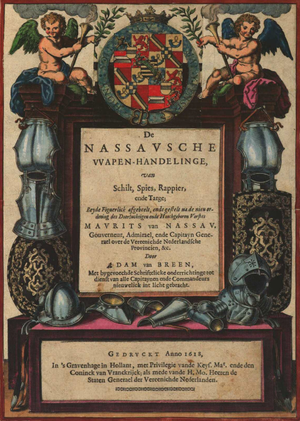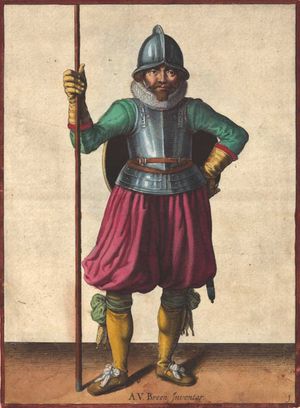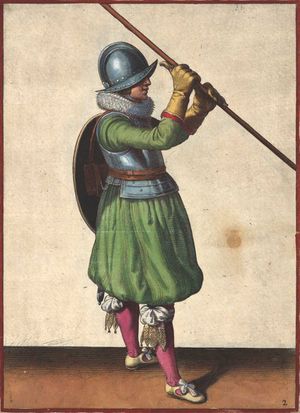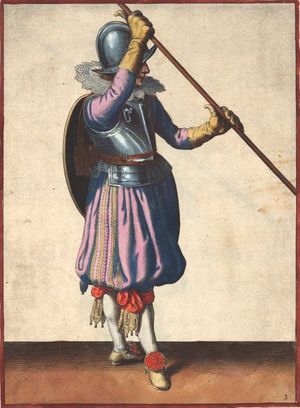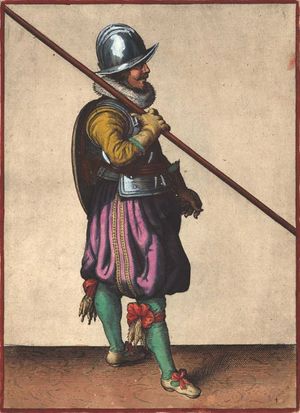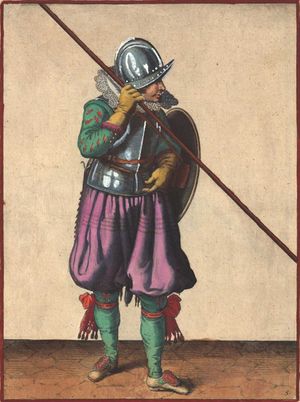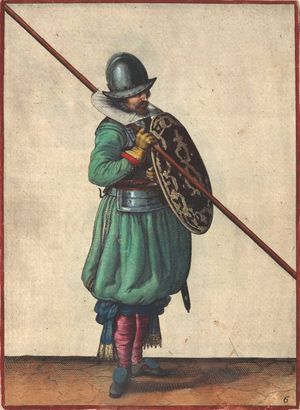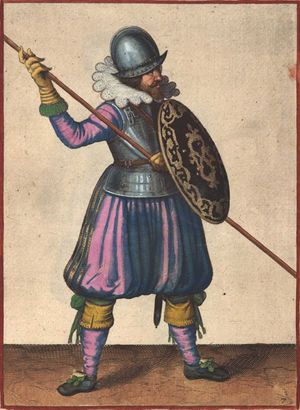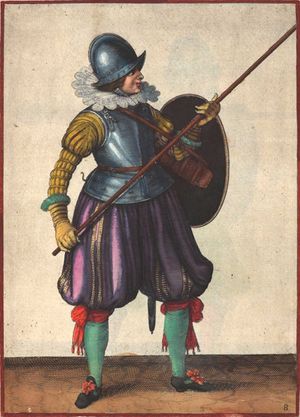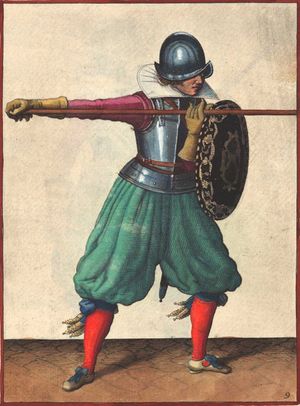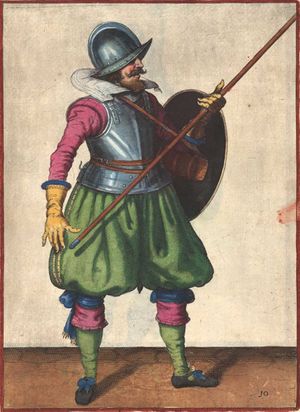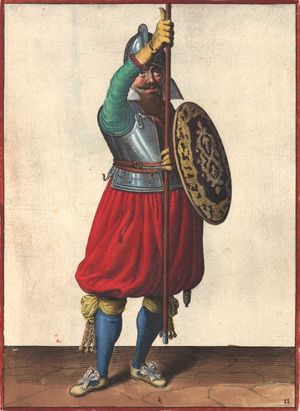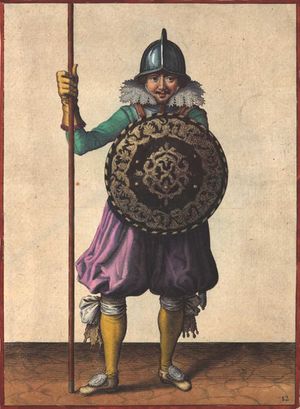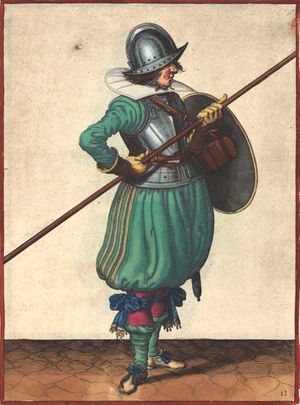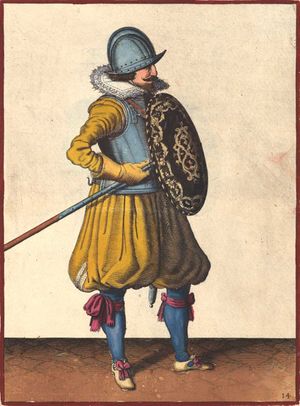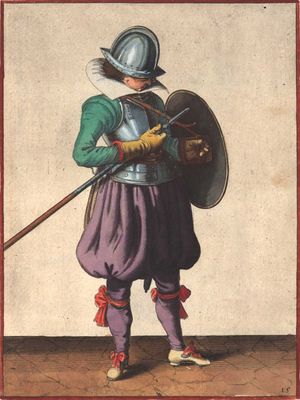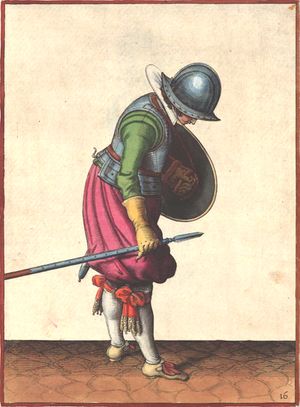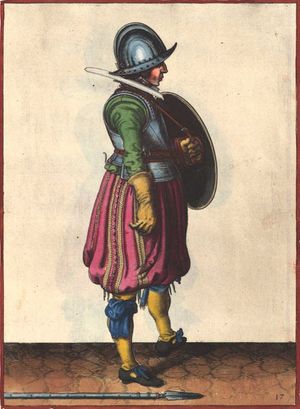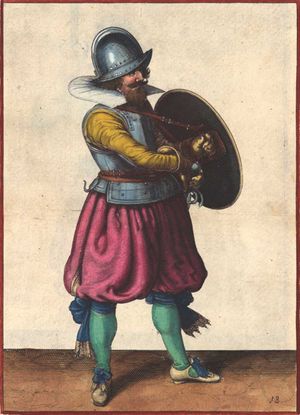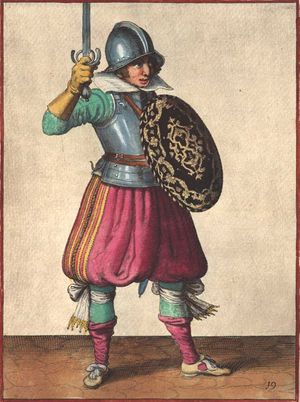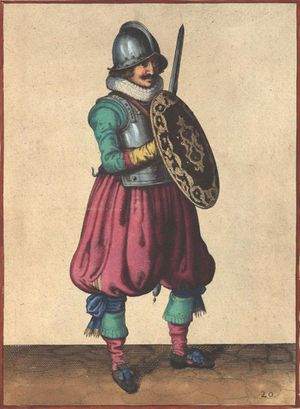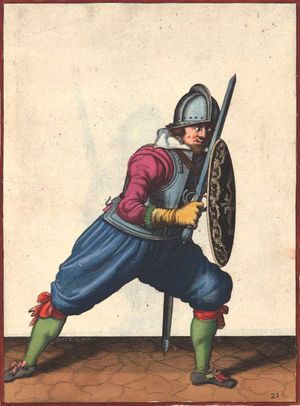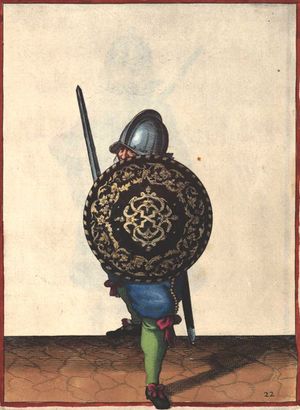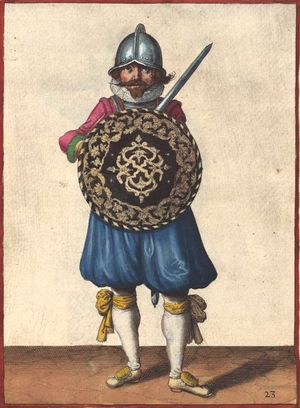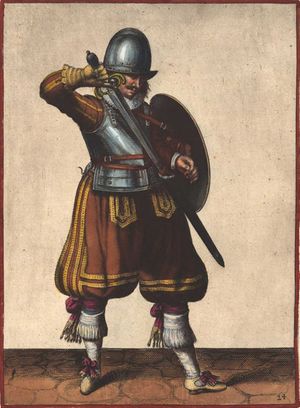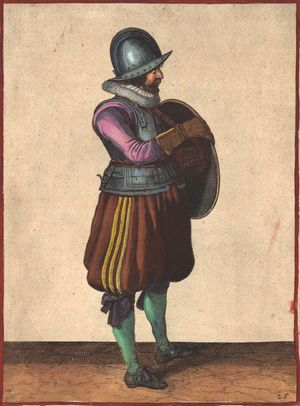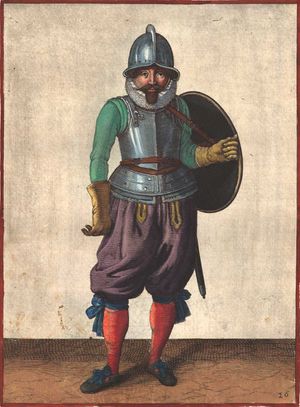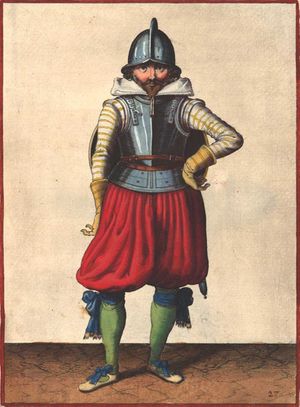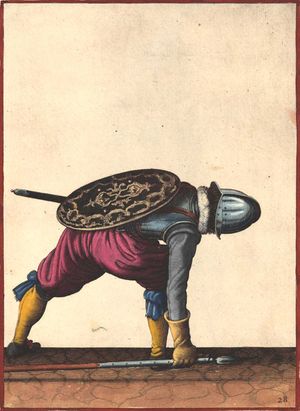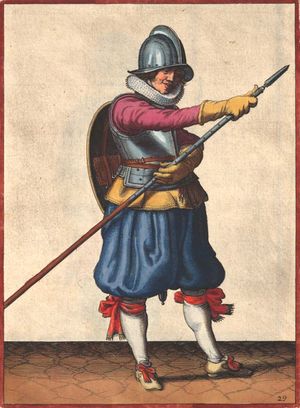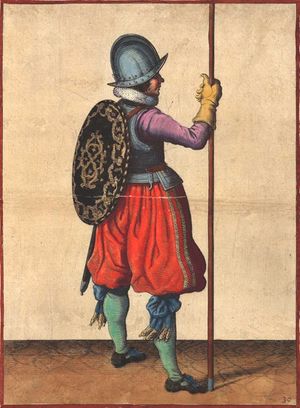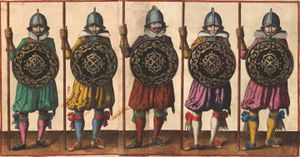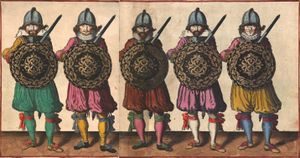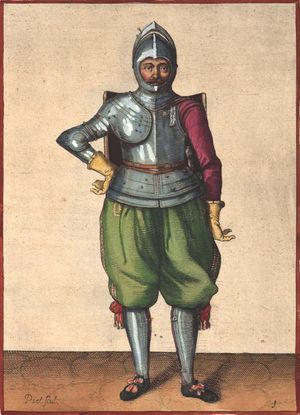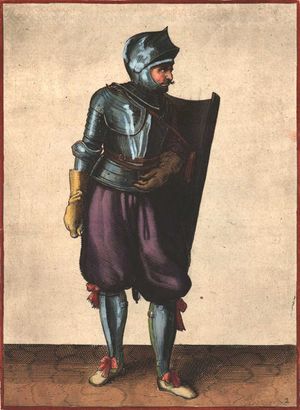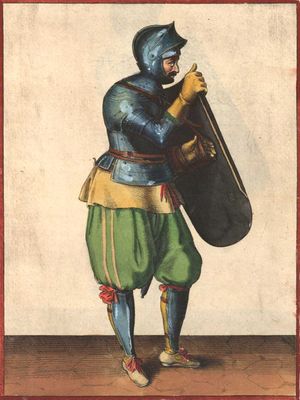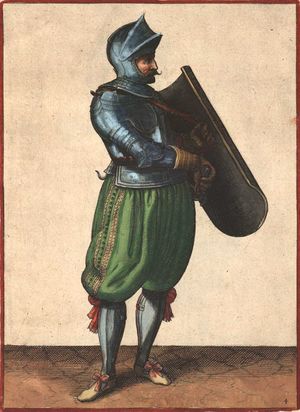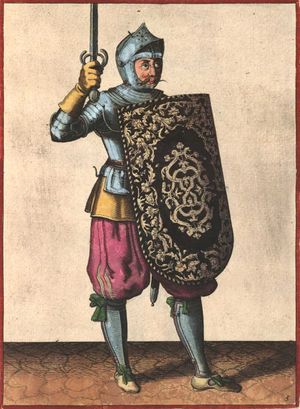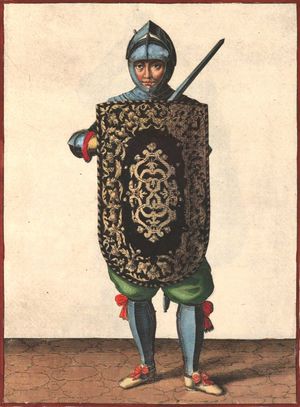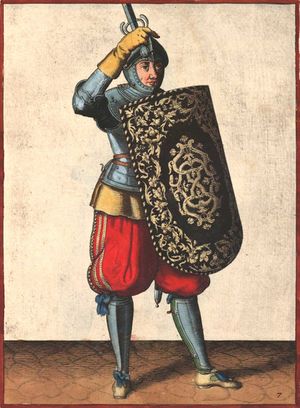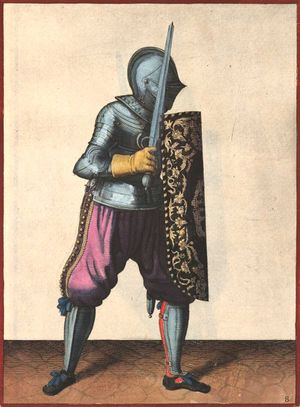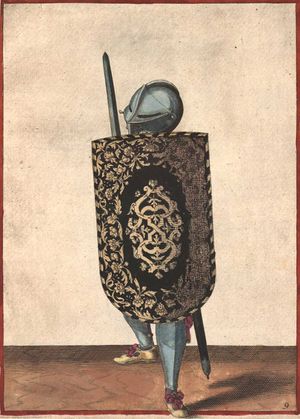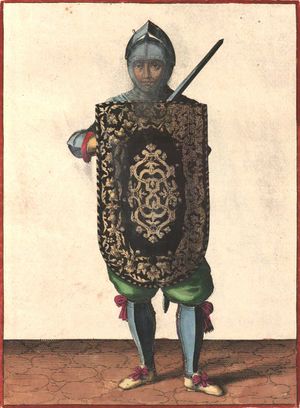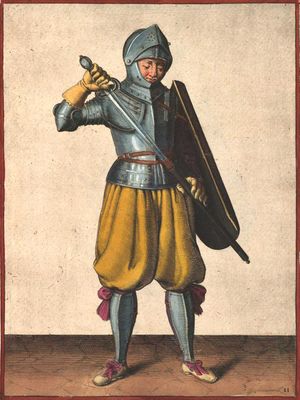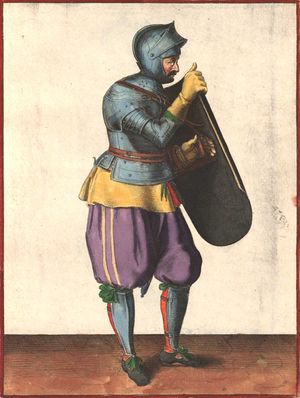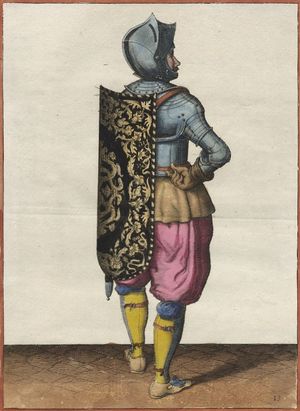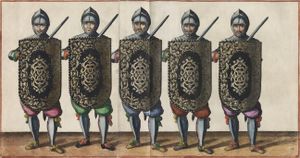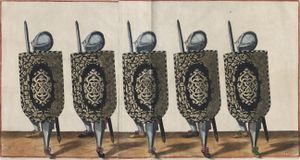|
|
You are not currently logged in. Are you accessing the unsecure (http) portal? Click here to switch to the secure portal. |
Difference between revisions of "Adam van Breen"
| (8 intermediate revisions by 2 users not shown) | |||
| Line 78: | Line 78: | ||
|- | |- | ||
| − | | <p>''By'' '''Adam van Breen''', | + | | <p>''By'' '''Adam van Breen''', Newly illuminated with written Instructions for your Captains and Commanders.</p> |
| | | | ||
| {{section|Page:De Nassavsche Wapen-Handelinge (Adam van Breen) 1618.pdf/11|2|lbl=-}} | | {{section|Page:De Nassavsche Wapen-Handelinge (Adam van Breen) 1618.pdf/11|2|lbl=-}} | ||
| Line 86: | Line 86: | ||
|- | |- | ||
| − | | <p>'''Printed''' Year 1618, at the Hague in Holland, with Privilege of the Imperial Majesty.<ref>I do not yet know the abbreviation, but "Mat." is also used in the Dutch transciption and the trascriber typed out "Majesteit" or Majesty.</ref>, | + | | <p>'''Printed''' Year 1618, at the Hague in Holland, with Privilege of the Imperial Majesty.<ref>I do not yet know the abbreviation, but "Mat." is also used in the Dutch transciption and the trascriber typed out "Majesteit" or Majesty.</ref>, of the Most Christian King of France, and also from the High and Mighty Lords of the State Generals of the United Provinces of the Netherlands. |
Printed by Arnoult Meuris<ref>I found several print references to an Arnoult Meuris in the 1600s at the Hague. I believe this is likely him</ref>.</p> | Printed by Arnoult Meuris<ref>I found several print references to an Arnoult Meuris in the 1600s at the Hague. I believe this is likely him</ref>.</p> | ||
| Line 100: | Line 100: | ||
| <p>'''TO ALL ADMIRERS''' OF '''ARMS WIELDING''' ADAM VAN BREEN wishes them prosperity and hapiness.</p> | | <p>'''TO ALL ADMIRERS''' OF '''ARMS WIELDING''' ADAM VAN BREEN wishes them prosperity and hapiness.</p> | ||
| − | <p>'''F'''LAVIUS VEGETIUS, the ancient author who is near to us lives through the writings in the Latin language on military order and wielding of the Arms of the Romans, testifies, which even the Histories report quite clearly, that the Romans, through no other means, became the masters of the entire universe than through serious wielding and continual exercise of arms. For what could (said the aforementioned Author) a small troop and a handful of Romans do against the multitude of Gauls? What can the little Italians do against these high and mighty Germans? It is notorious enough that the Spaniards not only in number, but also in bodily strength surpassed them. And that in the beginning there was nothing to compare to the cunning and wealth of the Africans, indeed, even to the prudence of the Greeks. Against all of this, it has been required and necessary, first of all in war, to select and maintain the dexterous and generous youth, and of those to train in the true wielding of arms by the Campidoctores (Vegetius gives such a name to Commanders and Officers who are teachers trained and experienced in arms) to learn and teach | + | <p>'''F'''LAVIUS VEGETIUS, the ancient author who is near to us lives through the writings in the Latin language on military order and wielding of the Arms of the Romans, testifies, which even the Histories report quite clearly, that the Romans, through no other means, became the masters of the entire universe than through serious wielding and continual exercise of arms. For what could (said the aforementioned Author) a small troop and a handful of Romans do against the multitude of Gauls? What can the little Italians do against these high and mighty Germans? It is notorious enough that the Spaniards not only in number, but also in bodily strength surpassed them. And that in the beginning there was nothing to compare to the cunning and wealth of the Africans, indeed, even to the prudence of the Greeks. Against all of this, it has been required and necessary, first of all in war, to select and maintain the dexterous and generous youth, and of those to train in the true wielding of arms by the Campidoctores (Vegetius gives such a name to Commanders and Officers who are teachers trained and experienced in arms) to learn and teach. The tardy and nonchalants duly punished; the virtuous and lively rewarded. Finally to make warriors out of them, transform them through continual, robust, and correct exercise. Since in Campaign, nothing could arise where they would not know be well-prepared for every occurrences and armed against every dangers - well-determined to resist and defend themselves and also ready if necessary to fearlessly seize the enemy.</p> |
| | | | ||
| {{section|Page:De Nassavsche Wapen-Handelinge (Adam van Breen) 1618.pdf/13|1|lbl=1}} | | {{section|Page:De Nassavsche Wapen-Handelinge (Adam van Breen) 1618.pdf/13|1|lbl=1}} | ||
| Line 109: | Line 109: | ||
|- | |- | ||
| | | | ||
| − | | <p>The science and wielding of arms engenders and nourishes generosity in Combat. There is no person who | + | | <p>The science and wielding of arms engenders and nourishes generosity in Combat. There is no person who could accomplish on a Campaign what he would not have learned correctly at Home better than the exercise of arms for the good of the Republics and Cities caused by a singular profit and prosperity in War. A General of an Army will accomplish more with a small troop of experienced soldiers than with a large army of badly trained men. The Greeks and especially the Romans have remarked on this, and those who succeeded them, great advantage will have befallen them.</p> |
| | | | ||
| {{section|Page:De Nassavsche Wapen-Handelinge (Adam van Breen) 1618.pdf/13|2|lbl=-}} | | {{section|Page:De Nassavsche Wapen-Handelinge (Adam van Breen) 1618.pdf/13|2|lbl=-}} | ||
| Line 127: | Line 127: | ||
|- | |- | ||
| | | | ||
| − | | <p>Now, to demonstrate the inclination and the gratitude that I owe to such a noble and illustrious Prince: for the progeny, this new '''WIELDING OF NASSUVIAN ARMS''', I wanted to produce and very strongly represent in-person, all of the POSTURES, of the legitimate weapons - Rotella, Pike, Sword, and Targe, consecutively - as well as for the present Prince to observe the Company of the Guards. So that Captains and Men of War not only delight in their contemplation but also to find it useful to imitate them, I wanted to add reasons briefly but nevertheless necessary instruction, making the figures speak. What | + | | <p>Now, to demonstrate the inclination and the gratitude that I owe to such a noble and illustrious Prince: for the progeny, this new '''WIELDING OF NASSUVIAN ARMS''', I wanted to produce and very strongly represent in-person, all of the POSTURES, of the legitimate weapons - Rotella, Pike, Sword, and Targe, consecutively - as well as for the present Prince to observe the Company of the Guards. So that Captains and Men of War not only delight in their contemplation but also to find it useful to imitate them, I wanted to add reasons briefly but nevertheless necessary instruction, making the figures speak. What sense of time, words of command to the Soldiers, that there is to observe, is clearly shown here by the characters in the ciphers, beginning from the first Figure until the last.</p> |
| | | | ||
| {{section|Page:De Nassavsche Wapen-Handelinge (Adam van Breen) 1618.pdf/13|4|lbl=-}} | | {{section|Page:De Nassavsche Wapen-Handelinge (Adam van Breen) 1618.pdf/13|4|lbl=-}} | ||
| Line 155: | Line 155: | ||
|- | |- | ||
| | | | ||
| − | | <p>Secondly, those who are armed with Targes are also represented with their armaments including Targes, Breastplates, Helmets, Arming Swords, having a Vambrace on their right arm, and greaves or leg armor on each leg. Being thus armed with Targes, having the helmets closed, concealing themselves behind the said Targes according to the word of command, will strongly charge with convenience at the Squad | + | | <p>Secondly, those who are armed with Targes are also represented with their armaments including Targes, Breastplates, Helmets, Arming Swords, having a Vambrace on their right arm, and greaves or leg armor on each leg. Being thus armed with Targes, having the helmets closed, concealing themselves behind the said Targes according to the word of command, will strongly charge with convenience at the their Squad of enemy Pikes, breaking them easily without receiving much damage because they are armed from head to toe<ref>Lit. "From the top of the head until the flat of the feet."</ref> and protected against the points of the pikes by consequence of being heavily armed. This very useful and necessary exercise, indeed very laudable, which all Princes and Army Generals easily understand without needing to explain further and embellish its value with many ornate words. Yet I still have to say this: the Soldiers exercising these armaments will not have any difficulty in walking this path of training with the goal of becoming a force to be reckoned with.<ref>Lit. "From aiming at a straight path but will be a path of force."</ref></p> |
| | | | ||
| {{section|Page:De Nassavsche Wapen-Handelinge (Adam van Breen) 1618.pdf/14|3|lbl=-}} | | {{section|Page:De Nassavsche Wapen-Handelinge (Adam van Breen) 1618.pdf/14|3|lbl=-}} | ||
| Line 164: | Line 164: | ||
|- | |- | ||
| | | | ||
| − | | <p>Desiring that the fruits of these new exercises could ever be as great (with Figures, demonstrations, and written teachings) as my zeal and desire has been | + | | <p>Desiring that the fruits of these new exercises could ever be as great (with Figures, demonstrations, and written teachings) as my zeal and desire has been from illuminating this book, WIELDING NASSUVIAN ARMS. Be to God, at the Hague, the Year 1618.</p> |
| | | | ||
| {{section|Page:De Nassavsche Wapen-Handelinge (Adam van Breen) 1618.pdf/14|4|lbl=-}} | | {{section|Page:De Nassavsche Wapen-Handelinge (Adam van Breen) 1618.pdf/14|4|lbl=-}} | ||
| Line 173: | Line 173: | ||
|- | |- | ||
| | | | ||
| − | | <p>''' | + | | <p>'''Remark on these words''' ''Rotella and Targe.''</p> |
| − | <p>For | + | <p>For completeness, having added to the benefit of the inexperienced, I will speak the true significance of the Rotella and Targe. In the first place, one needs to know that this word Rotella, to hear the arms made in the shape of a Chariot axle which is fully round, and in this fashion named Rotella, and those who carry such arms, Rodoleros. Even with the Figures alone it is obvious. The Latins and Greeks gave the Rotella the names Clypeus, Aspis, Parma, from which fashion the Pelta hardly differs, being mostly round with with the top hollowed in the shape of a crescent. This Figure is drawn from an old Marble in Rome, as recited by the Analects of Lipsius<ref>Likely Justus Lipsius, a Flemish philosopher who died before this was published.</ref> that the rotella is fully round. Virgil testifies it in Aenid 2.</p> |
| − | <poem> ''---- | + | <p><poem> ''---- under the circle of her shield.<ref>Aeneid III</ref>'' |
| − | '' | + | ''like an Argive shield or the lamp of Phoebus'' |
| − | And Cato | + | And Cato on the ''Origins'': ''Greek round shield.'' |
| − | Item 111. | + | Item 111.</p> |
| − | <p>One could produce many other | + | <p>One could produce many other evidence that are not difficult to find, but we omit them in order to be much more brief.</p> |
| | | | ||
| {{section|Page:De Nassavsche Wapen-Handelinge (Adam van Breen) 1618.pdf/14|5|lbl=-}} | | {{section|Page:De Nassavsche Wapen-Handelinge (Adam van Breen) 1618.pdf/14|5|lbl=-}} | ||
| Line 194: | Line 194: | ||
| <p>For the second which is named Targe has much in common (in my opinion) with the Roman Scutum, which has a quite long shape. The Poet aforemention in Aenids 8: | | <p>For the second which is named Targe has much in common (in my opinion) with the Roman Scutum, which has a quite long shape. The Poet aforemention in Aenids 8: | ||
| − | ''----- | + | ''----- long shields defending their bodies.'' |
| − | Scutum (according to the words of Livy) was the above which the chest and the shoulders are covered, the rim smooth and not rounded, and the lower part terminates round. The Shields of Africans are not dissimilar to these, called | + | Scutum (according to the words of Livy) was the above which the chest and the shoulders are covered, the rim smooth and not rounded, and the lower part terminates round. The Shields of Africans are not dissimilar to these, called Caetra, which have been used by the Spaniards. These Scuta and Cetrae were large and light, which one could assess from the testimonies of ancient Authors. From the Spaniards, mentioned Livy recites in book 31 that when laying down and resting on their shields, they would cross the river by swimming. Ammianus Marcellinus in book 16 recites a similar Story, "The type that the ancients have made their shields is of a light material from interlaced cords or wood or from twigs." The Germans also had these types of shields which Tacitus ''On The Characters of the Germans'' testifies that they neither have 400 years of history, they were still in use among them. ''Counsel of Tyrol of the Scots to the son of Fridebrandum'', section 30: <ref>The searchable title is "Paraeneses antiquae germanicae tyrolis regis scotorum ad filium fridebrantum."</ref></p> |
| | | | ||
| {{section|Page:De Nassavsche Wapen-Handelinge (Adam van Breen) 1618.pdf/14|6|lbl=-}} | | {{section|Page:De Nassavsche Wapen-Handelinge (Adam van Breen) 1618.pdf/14|6|lbl=-}} | ||
| Line 211: | Line 211: | ||
<p>''When you cover the shield with animal hide, what do you apply to construct it? Glue.'' | <p>''When you cover the shield with animal hide, what do you apply to construct it? Glue.'' | ||
| − | <p>Polybius describes the Scuta of the Romans very clearly as well as scholarly. Lipsius ''On the Military of Rome'' book 3, Dial. 2, See again in his Analect. I believe that this hide or | + | <p>Polybius describes the Scuta of the Romans very clearly as well as scholarly. Lipsius ''On the Military of Rome'' book 3, Dial. 2, See again in his Analect. I believe that this hide or Tërgora, among the Italians Targa, the Spaniards Tarja, and among the French Targe, has become what now means buckler or shield. What's more, this word Targa is still in use among the last of the bastardized Greeks, according to the testimonies of ''Gloss of the Greek Barbarians.'' Even among Authors who have written in Latin for about 400 years, the Targia has been surviving. Jacques de Vitry, Bishop of Acre, in ''Eastern History'' wrote, "With the shield that is called Targias." The Targes of his Excellency are also made of wood, covered with leather. This, dear reader, is what I wanted to show you. Receive this with pleasure. Be to God.</p> |
| | | | ||
| {{section|Page:De Nassavsche Wapen-Handelinge (Adam van Breen) 1618.pdf/14|7|lbl=-}} | | {{section|Page:De Nassavsche Wapen-Handelinge (Adam van Breen) 1618.pdf/14|7|lbl=-}} | ||
| Line 219: | Line 219: | ||
|- | |- | ||
| − | + | | | |
| − | + | | | |
| − | + | | | |
| − | + | | | |
{{section|Page:De Nassavsche Wapen-Handelinge (Adam van Breen) 1618.pdf/15|1|lbl=3|p=1}}<br/>{{section|Page:De Nassavsche Wapen-Handelinge (Adam van Breen) 1618.pdf/16|1|lbl=4|p=1}} | {{section|Page:De Nassavsche Wapen-Handelinge (Adam van Breen) 1618.pdf/15|1|lbl=3|p=1}}<br/>{{section|Page:De Nassavsche Wapen-Handelinge (Adam van Breen) 1618.pdf/16|1|lbl=4|p=1}} | ||
| − | + | | | |
| − | + | | | |
|} | |} | ||
| Line 246: | Line 246: | ||
|- | |- | ||
| | | | ||
| − | | <p>'''Brief and succinct teaching on the figures por'''trayed, regarding the correct use of everything that is necessary for a Soldier on wielding the Rotella, Sword, and Pike | + | | <p>'''Brief and succinct teaching on the figures por'''trayed, regarding the correct use of everything that is necessary for a Soldier on wielding the Rotella, Sword, and Pike. And this Instruction corresponds to each Figure by the following numbers.</p> |
| <p>'''The exercise of armes ''wherein lively''''' figures is showne the Right Use and perfect manner of Handling the Buckler Sword and Pike with the words of Command and Brefe Instructions correspondent to every Posture.</p> | | <p>'''The exercise of armes ''wherein lively''''' figures is showne the Right Use and perfect manner of Handling the Buckler Sword and Pike with the words of Command and Brefe Instructions correspondent to every Posture.</p> | ||
| {{section|Page:De Nassavsche Wapen-Handelinge (Adam van Breen) 1618.pdf/17|top|lbl=5}} | | {{section|Page:De Nassavsche Wapen-Handelinge (Adam van Breen) 1618.pdf/17|top|lbl=5}} | ||
| Line 259: | Line 259: | ||
<p>'''1. Carry your Pike slanted.'''</p> | <p>'''1. Carry your Pike slanted.'''</p> | ||
| − | <p>1. '''In''' exercising this, demonstrate to the Soldier firstly how | + | <p>1. '''In''' exercising this, demonstrate to the Soldier firstly how standing in order with the Pike, he will hold and carry the Rotella well behind (this is namely so that he will not be burdened by the Rotella in some way) or else otherwise on the back, and will plant the Pike near the right foot, the arm somewhat extended but curved or bent to be able to conveniently join the Pike to the side closing ranks.</p> |
| <p><br/></p> | | <p><br/></p> | ||
| Line 316: | Line 316: | ||
<p>'''4. The third time.'''</p> | <p>'''4. The third time.'''</p> | ||
| − | <p>4. How he will carry the Pike slanted, in order to march conveniently in a tight formation without injuring | + | <p>4. How he will carry the Pike slanted, in order to march conveniently in a tight formation without injuring one another with the point.</p> |
| <p>'''March with ÿo<sup>r</sup> Pike sloping.'''</p> | | <p>'''March with ÿo<sup>r</sup> Pike sloping.'''</p> | ||
| Line 380: | Line 380: | ||
| <p>'''8. The second time.'''</p> | | <p>'''8. The second time.'''</p> | ||
| − | <p>8. How after having again presented the Pike with the point forward, | + | <p>8. How after having again presented the Pike with the point forward, for the second instance, he will take it with the right hand on the bottom of the butt and will let it conveniently sink from high to low in order to be able to drop the Pike down in front.</p> |
| <p>'''2 Motion'''</p> | | <p>'''2 Motion'''</p> | ||
| Line 395: | Line 395: | ||
| <p>'''9. The third time.'''</p> | | <p>'''9. The third time.'''</p> | ||
| − | <p>9. How he will drop the third point the Pike, holding the right arm | + | <p>9. How he will drop the third point the Pike, holding the right arm strongly extended. And from the same right hand, he will hold it very firmly, and from the left elbow will plant it firmly against the hip, as he will discover in this Figure.</p> |
| <p>'''3. Motion'''</p> | | <p>'''3. Motion'''</p> | ||
| Line 412: | Line 412: | ||
<p>'''10. The first time.'''</p> | <p>'''10. The first time.'''</p> | ||
| − | <p>10. How he will put back on the ground his Pike in three times | + | <p>10. How he will put back on the ground his Pike in three times. Firstly, he will release the right hand from the butt and let it sink.</p> |
| <p>'''Order yo<sup>r</sup>. Pike.'''</p> | | <p>'''Order yo<sup>r</sup>. Pike.'''</p> | ||
| Line 446: | Line 446: | ||
| <p>'''12. The third time.'''</p> | | <p>'''12. The third time.'''</p> | ||
| − | <p>How he will hold the Pike for the third time in the right hand, as | + | <p>How he will hold the Pike for the third time in the right hand, as said, against the thumb near the right foot, in order to wield it so much more conveniently.</p> |
| | | | ||
| {{section|Page:De Nassavsche Wapen-Handelinge (Adam van Breen) 1618.pdf/17|12|lbl=-}} | | {{section|Page:De Nassavsche Wapen-Handelinge (Adam van Breen) 1618.pdf/17|12|lbl=-}} | ||
| Line 459: | Line 459: | ||
| <p>'''13. Carry your dragging Pikes.'''</p> | | <p>'''13. Carry your dragging Pikes.'''</p> | ||
| − | <p>13. How he will drag the Pike | + | <p>13. How he will drag the Pike. Firstly he must let the Pike sink behind him and palm it just so he can take it near the thumb to drag the iron with the hand.</p> |
| <p>'''Trayle yo<sup>r</sup>. Pike.'''</p> | | <p>'''Trayle yo<sup>r</sup>. Pike.'''</p> | ||
| Line 474: | Line 474: | ||
| <p><br></p> | | <p><br></p> | ||
| − | <p>14. How in dragging the Pike, he will carry it and grab it near the point | + | <p>14. How in dragging the Pike, he will carry it and grab it near the point, and he must hold it on the right hand next to the brace.</p> |
| <p>'''How'''</p> | | <p>'''How'''</p> | ||
| Line 504: | Line 504: | ||
| <p>'''16. Let your Pike fall on the ground.'''</p> | | <p>'''16. Let your Pike fall on the ground.'''</p> | ||
| − | <p>16. How he will put his Pike on the ground near his right foot, namely that he will lower himself on the same side with the Pike in order to let it sink freely on the ground | + | <p>16. How he will put his Pike on the ground near his right foot, namely that he will lower himself on the same side with the Pike in order to let it sink freely on the ground in order to not damage it.</p> |
| <p>'''Laÿ downe ÿo<sup>r</sup> Pike.'''</p> | | <p>'''Laÿ downe ÿo<sup>r</sup> Pike.'''</p> | ||
| Line 517: | Line 517: | ||
|- | |- | ||
| [[File:De Nassavsche Wapen-Handelinge van Schilt, Spies, Rappier end Targe 17.jpg|300px|center]] | | [[File:De Nassavsche Wapen-Handelinge van Schilt, Spies, Rappier end Targe 17.jpg|300px|center]] | ||
| − | | <p>17. How he | + | | <p>17. How he stands fully ready with the Rotella and the Pike is near to his right foot, waiting for some subsequent command. |
| <p>How he must stand upright with his Buckler in readines, his Pike layd at his right foot expecting further command</p> | | <p>How he must stand upright with his Buckler in readines, his Pike layd at his right foot expecting further command</p> | ||
| {{section|Page:De Nassavsche Wapen-Handelinge (Adam van Breen) 1618.pdf/18|17|lbl=-}} | | {{section|Page:De Nassavsche Wapen-Handelinge (Adam van Breen) 1618.pdf/18|17|lbl=-}} | ||
| Line 573: | Line 573: | ||
| <p>'''21. Cover yourself.'''</p> | | <p>'''21. Cover yourself.'''</p> | ||
| − | <p>21. How he will cover himself before his Enemy, namely | + | <p>21. How he will cover himself before his Enemy, namely that he will have to position his Rotella against the left thigh very firmly and against the same-sided Shoulder. And the guard of his Sword against the inner edge of his Rotella so that he can withstand the attack. And also the left edge of his Morion<ref>A type of 16th-17th century helmet.</ref> against the inner edge of the Rotella in order to protect his vision such that he can only see which side his Enemy will come to atack him.</p> |
| <p>'''Guard ÿour selfe.'''</p> | | <p>'''Guard ÿour selfe.'''</p> | ||
| Line 588: | Line 588: | ||
| <p><br></p> | | <p><br></p> | ||
| − | <p>22. We present here how the Soldier could cover himself with the Rotella and his | + | <p>22. We present here how the Soldier could cover himself with the Rotella and his Sword against the tip of the Pike, as in the preceding Figure.</p> |
| <p>'''A second garding Posture.'''</p> | | <p>'''A second garding Posture.'''</p> | ||
| Line 603: | Line 603: | ||
| <p>'''23. Straighten yourself.'''</p> | | <p>'''23. Straighten yourself.'''</p> | ||
| − | <p>23. How he will straighten in the posture, namely | + | <p>23. How he will straighten in the posture, namely by standing, which will be most convenient to put the left foot and the left shoulder forward in order to lean or rest against the same side as the Rotella. And in order to demonstrate a free and unforced posture well and everything else, the right arm is again placed with the Sword towards the left shoulder between the Rotella, as was taught in the twentieth Figure.</p> |
| <p>'''Releeve your selfe.'''</p> | | <p>'''Releeve your selfe.'''</p> | ||
| Line 633: | Line 633: | ||
| <p>'''25. Withdraw your arms out of the braces of your Rotella.'''</p> | | <p>'''25. Withdraw your arms out of the braces of your Rotella.'''</p> | ||
| − | <p>25. How he will withdraw his arms out of the braces of the Rotella. He will have to hold | + | <p>25. How he will withdraw his arms out of the braces of the Rotella. He will have to firmly hold the Rotella with the right hand.</p> |
| <p>'''Draw yo<sup>r</sup>. armed out of the braces of you<sup>r</sup> Buckler'''<br/></p> | | <p>'''Draw yo<sup>r</sup>. armed out of the braces of you<sup>r</sup> Buckler'''<br/></p> | ||
| Line 648: | Line 648: | ||
| <p>'''26. Put your Rotella back behind your back.'''</p> | | <p>'''26. Put your Rotella back behind your back.'''</p> | ||
| − | <p>26. How he will put back again the Rotella on the back | + | <p>26. How he will put back again the Rotella on the back. He will have to do this with his left arm as can be seen in the Figure.</p> |
| <p>'''Put yo<sup>r</sup>. Buckler behind yo<sup>r</sup>. backe.'''</p> | | <p>'''Put yo<sup>r</sup>. Buckler behind yo<sup>r</sup>. backe.'''</p> | ||
| Line 661: | Line 661: | ||
|- | |- | ||
| [[File:De Nassavsche Wapen-Handelinge van Schilt, Spies, Rappier end Targe 27.jpg|300px|center]] | | [[File:De Nassavsche Wapen-Handelinge van Schilt, Spies, Rappier end Targe 27.jpg|300px|center]] | ||
| − | | <p>27. How | + | | <p>27. How standing with his Rotella on the back, he will wait for another command.</p> |
| <p>How the Soldier standing upright with the Buckler at his backe shall attend further Command.</p> | | <p>How the Soldier standing upright with the Buckler at his backe shall attend further Command.</p> | ||
| {{section|Page:De Nassavsche Wapen-Handelinge (Adam van Breen) 1618.pdf/18|27|lbl=-}} | | {{section|Page:De Nassavsche Wapen-Handelinge (Adam van Breen) 1618.pdf/18|27|lbl=-}} | ||
| Line 672: | Line 672: | ||
| <p>'''28. Raise your Pike.'''</p> | | <p>'''28. Raise your Pike.'''</p> | ||
| − | <p>How he will raise his Pike from the ground for the first time. He will have to lift it up with the hand as long as it is possible. And it will be necessary that he will hold his right foot firmly on the same place and pull the left foot back if it is forward, namely without forcing it | + | <p>How he will raise his Pike from the ground for the first time. He will have to lift it up with the hand as long as it is possible. And it will be necessary that he will hold his right foot firmly on the same place and pull the left foot back if it is forward, namely without forcing it so that he may drop from the side towards the Pike in order to lift it or pick it up.</p> |
| <p>'''Take up yo<sup>r</sup>. Pike.'''</p> | | <p>'''Take up yo<sup>r</sup>. Pike.'''</p> | ||
| Line 696: | Line 696: | ||
| <p>'''30. Replant your Pike as before.'''</p> | | <p>'''30. Replant your Pike as before.'''</p> | ||
| − | <p>30. How he will put the Pike | + | <p>30. How he will put the Pike back for the third and final time. Put it back again near the right foot, holding it in the right hand with the arms bent or curved, as taught in the first Figure.</p> |
| | | | ||
| {{section|Page:De Nassavsche Wapen-Handelinge (Adam van Breen) 1618.pdf/18|30|lbl=-}} | | {{section|Page:De Nassavsche Wapen-Handelinge (Adam van Breen) 1618.pdf/18|30|lbl=-}} | ||
| Line 707: | Line 707: | ||
|- | |- | ||
| [[File:De Nassavsche Wapen-Handelinge van Schilt, Spies, Rappier end Targe 31.jpg|300px|center]] | | [[File:De Nassavsche Wapen-Handelinge van Schilt, Spies, Rappier end Targe 31.jpg|300px|center]] | ||
| − | | <p>31. Here are presented five Figures in order to demonstrate how close together they have to be to hold their order, namely | + | | <p>31. Here are presented five Figures in order to demonstrate how close together they have to be to hold their order, namely as close together as possible. And according to the Captain or the Officer will find it good and suitable depending on the occassion.</p> |
| | | | ||
| {{section|Page:De Nassavsche Wapen-Handelinge (Adam van Breen) 1618.pdf/18|31|lbl=-}} | | {{section|Page:De Nassavsche Wapen-Handelinge (Adam van Breen) 1618.pdf/18|31|lbl=-}} | ||
| Line 716: | Line 716: | ||
|- | |- | ||
| [[File:De Nassavsche Wapen-Handelinge van Schilt, Spies, Rappier end Targe 32.jpg|300px|center]] | | [[File:De Nassavsche Wapen-Handelinge van Schilt, Spies, Rappier end Targe 32.jpg|300px|center]] | ||
| − | | <p>32. Here again is a single rank with the Rotella and the Sword in order to demonstrate how one can close themselves together again because the Pike is | + | | <p>32. Here again is a single rank with the Rotella and the Sword in order to demonstrate how one can close themselves together again because the Pike is blocked. However, the Rotellas of the rank that are between two others will have to hold a suitable position so that everyone can draw his Sword conveniently and use it against the Enemy.</p> |
| <p>Here also is represented a Ran[...]<br/>to showe how they maÿ shut their [...]<br/>no waies hindering them) ÿet so th[...]<br/>quisite place, to the end that ea[...]<br/>draw his sword and use it agai[...]<ref>The Bodleian Library copy, which was the basis of this transcription, is torn off at the fold, so half of the text is missing.</ref></p> | | <p>Here also is represented a Ran[...]<br/>to showe how they maÿ shut their [...]<br/>no waies hindering them) ÿet so th[...]<br/>quisite place, to the end that ea[...]<br/>draw his sword and use it agai[...]<ref>The Bodleian Library copy, which was the basis of this transcription, is torn off at the fold, so half of the text is missing.</ref></p> | ||
| {{section|Page:De Nassavsche Wapen-Handelinge (Adam van Breen) 1618.pdf/18|32|lbl=-}} | | {{section|Page:De Nassavsche Wapen-Handelinge (Adam van Breen) 1618.pdf/18|32|lbl=-}} | ||
| Line 734: | Line 734: | ||
|- | |- | ||
| − | + | | | |
| − | + | | <p>The words of Command according to which the Captains will make their Soldiers train so that when they are in front, they can wield the Rotella. He will have to understand that in order to maintain order, one makes them follow the Figures as much as it is necessary. Apart from a few Figures where the Soldier presents being upright without action, at which point one can be served with general command instead.</p> | |
| − | + | | | |
| − | + | | | |
| − | + | | | |
| − | + | | {{section|Page:Le Maniement d’Armes De Nassau (Adam van Breen) 1618.pdf/10|7|lbl=-}} | |
| − | + | | | |
|} | |} | ||
| Line 802: | Line 802: | ||
| <p>'''Prepare your Targe for your Sword.'''</p> | | <p>'''Prepare your Targe for your Sword.'''</p> | ||
| − | <p>2. How for more convenience he will promptly present the Targe from behind his back to in front of his body, | + | <p>2. How for more convenience he will promptly present the Targe from behind his back to in front of his body, which is by withdrawing his left foot and shaking his left shoulder, he will make the Targe slip forward.</p> |
| <p>'''Prepare ÿo<sup>r</sup>. Target for ÿo<sup>r</sup>. sword.'''</p> | | <p>'''Prepare ÿo<sup>r</sup>. Target for ÿo<sup>r</sup>. sword.'''</p> | ||
| Line 816: | Line 816: | ||
|- | |- | ||
| [[File:De Nassavsche Wapen-Handelinge van Schilt, Spies, Rappier end Targe 35.jpg|300px|center]] | | [[File:De Nassavsche Wapen-Handelinge van Schilt, Spies, Rappier end Targe 35.jpg|300px|center]] | ||
| − | | <p>3. How he will hold his Targe to ready the Sword | + | | <p>3. How he will hold his Targe to ready the Sword, that is with his right hand he will firmly hold the Targe above so that he can much better put his hand between the braces in order to hold it, thus readying his Sword to be able draw it out.</p> |
| <p>How he shall make ready his Target for his sword, that is he shallhold his Target fast above with his right hand, that he maÿ the more easilÿ put his hand betweene the Brases, and so be readÿ to draw his sword.</p> | | <p>How he shall make ready his Target for his sword, that is he shallhold his Target fast above with his right hand, that he maÿ the more easilÿ put his hand betweene the Brases, and so be readÿ to draw his sword.</p> | ||
| {{section|Page:De Nassavsche Wapen-Handelinge (Adam van Breen) 1618.pdf/21|3|lbl=-}} | | {{section|Page:De Nassavsche Wapen-Handelinge (Adam van Breen) 1618.pdf/21|3|lbl=-}} | ||
| Line 857: | Line 857: | ||
| <p>'''Put your Sword between the Targe and the chest.'''</p> | | <p>'''Put your Sword between the Targe and the chest.'''</p> | ||
| − | <p>6. How in holding again his Targe against his body and the left shoulder, he will have to place his Sword between the Targe and his shoulder as said | + | <p>6. How in holding again his Targe against his body and the left shoulder, he will have to place his Sword between the Targe and his shoulder as said, waiting in such a posture that one would want to further command.</p> |
| <p>'''Put ÿo<sup>r</sup>. sword betweene ÿo<sup>r</sup>. Target and brest'''</p> | | <p>'''Put ÿo<sup>r</sup>. sword betweene ÿo<sup>r</sup>. Target and brest'''</p> | ||
| Line 872: | Line 872: | ||
| <p>'''Close your Helmet.'''</p> | | <p>'''Close your Helmet.'''</p> | ||
| − | <p>7. How he will close his Helmet so that this it is done promptly with convenience | + | <p>7. How he will close his Helmet so that this it is done promptly with convenience. He will close it with his thumb and first finger and will nevertheless firmly hold his Sword with the other fingers so that he at once be ready.</p> |
| <p>'''Close yo<sup>r</sup>. Casquet.'''</p> | | <p>'''Close yo<sup>r</sup>. Casquet.'''</p> | ||
| Line 887: | Line 887: | ||
| <p>'''Cover yourself.'''</p> | | <p>'''Cover yourself.'''</p> | ||
| − | <p>8. How he will cover himself well | + | <p>8. How he will cover himself well. He will hold the Targe in front of him against the left knee and from above against the same shoulder, very firmly holding from this side against the Point or the edge. And to the right side or flank he too will support himself with the guard of the Sword until such that he can use it.</p> |
| <p>'''Gard yo<sup>r</sup>. self.'''</p> | | <p>'''Gard yo<sup>r</sup>. self.'''</p> | ||
| Line 902: | Line 902: | ||
| <p><br></p> | | <p><br></p> | ||
| − | <p>9. How he | + | <p>9. How he demonstrates as before in order to much better present how little his Enemy can damage him.</p> |
| <p>'''A second garding Posture.'''</p> | | <p>'''A second garding Posture.'''</p> | ||
| Line 921: | Line 921: | ||
| <p>'''Straighten yourself.'''</p> | | <p>'''Straighten yourself.'''</p> | ||
| − | <p>10. How he will straighten and | + | <p>10. How he will straighten and stand in the same manner as he demonstrated in the sixth Figure.</p> |
| <p>'''Releive yo<sup>r</sup> selfe.'''</p> | | <p>'''Releive yo<sup>r</sup> selfe.'''</p> | ||
| Line 936: | Line 936: | ||
| <p>'''Put back your Sword.'''</p> | | <p>'''Put back your Sword.'''</p> | ||
| − | <p>11. How he will put his sword back in the scabbard | + | <p>11. How he will put his sword back in the scabbard. He will have to firmly hold it in his left hand as before with ease and without impediment in putting back his Sword.</p> |
| <p>'''Put up yo<sup>r</sup> sword.'''</p> | | <p>'''Put up yo<sup>r</sup> sword.'''</p> | ||
| Line 951: | Line 951: | ||
| <p>'''Withdraw your arms out of the Targe.'''</p> | | <p>'''Withdraw your arms out of the Targe.'''</p> | ||
| − | <p>12. How he will withdraw his arms out of the braces of the Targe | + | <p>12. How he will withdraw his arms out of the braces of the Targe. He will have to firmly hold it with the right hand, all of which the third Figure has shown.</p> |
| <p>'''withdraw yo<sup>r</sup>. armes out of yo<sup>r</sup>. Target.'''</p> | | <p>'''withdraw yo<sup>r</sup>. armes out of yo<sup>r</sup>. Target.'''</p> | ||
| Line 987: | Line 987: | ||
|- | |- | ||
| − | + | | [[File:De Nassavsche Wapen-Handelinge van Schilt, Spies, Rappier end Targe 47.jpg|300px|center]] | |
| − | + | | <p>15. How the ranks will deploy tightly when one will command them to cover themselves.</p> | |
| − | + | | <p>Here is also showne how close the soldier must keepe his Ranke when he is commanded to gard or cover himselfe.</p> | |
| − | + | | {{section|Page:De Nassavsche Wapen-Handelinge (Adam van Breen) 1618.pdf/21|15|lbl=-}} | |
| − | + | | | |
| − | + | | {{section|Page:Le Maniement d’Armes De Nassau (Adam van Breen) 1618.pdf/71|17|lbl=-}} | |
| − | + | | | |
|} | |} | ||
| Line 1,021: | Line 1,021: | ||
{{sourcebox | {{sourcebox | ||
| work = Dutch Transcription | | work = Dutch Transcription | ||
| − | | authors = [[ | + | | authors = [[Deandra de Looff]] |
| source link = | | source link = | ||
| source title= [[Index:De Nassavsche Wapen-Handelinge (Adam van Breen) 1618.pdf|De Nassavsche Wapen-Handelinge (Adam van Breen) 1618]] | | source title= [[Index:De Nassavsche Wapen-Handelinge (Adam van Breen) 1618.pdf|De Nassavsche Wapen-Handelinge (Adam van Breen) 1618]] | ||
| Line 1,035: | Line 1,035: | ||
{{sourcebox | {{sourcebox | ||
| work = French Transcription | | work = French Transcription | ||
| − | | authors = [[ | + | | authors = [[Michael Chidester]] |
| source link = | | source link = | ||
| source title= [[Index:Le Maniement d’Armes De Nassau (Adam van Breen) 1618.pdf|Index:Le Maniement d’Armes De Nassau (Adam van Breen) 1618]] | | source title= [[Index:Le Maniement d’Armes De Nassau (Adam van Breen) 1618.pdf|Index:Le Maniement d’Armes De Nassau (Adam van Breen) 1618]] | ||
| Line 1,049: | Line 1,049: | ||
{{sourcebox | {{sourcebox | ||
| work = English Transcription | | work = English Transcription | ||
| − | | authors = [[ | + | | authors = [[Michael Chidester]] |
| source link = | | source link = | ||
| source title= {{nowrap|[[Index:Mars his Feild or The Exercise of Armes (Adam van Breen) 1625.pdf|Index:Mars his Feild or The Exercise of Armes (Adam van Breen) 1625]]}} | | source title= {{nowrap|[[Index:Mars his Feild or The Exercise of Armes (Adam van Breen) 1625.pdf|Index:Mars his Feild or The Exercise of Armes (Adam van Breen) 1625]]}} | ||
| Line 1,058: | Line 1,058: | ||
== Additional Resources == | == Additional Resources == | ||
| + | |||
| + | {{bibliography}} | ||
== References == | == References == | ||
Latest revision as of 20:52, 29 August 2025
| Adam van Breen | |
|---|---|
| Born | 1585 Amsterdam |
| Died | 1642 Norway |
| Spouse(s) | Maria Gelle |
| Occupation |
|
| Nationality | Dutch |
| Genres | Drill manual |
| Language | |
| Notable work(s) | De Nassavsche Wapen-Handelinge van Schilt, Spies, Rappier end Targe (1618) |
| Concordance by | Michael Chidester |
Adam van Breen (Amsterdam, 1585 - Norway, after 1642) was a Dutch artist from the Golden Age. Van Breen was born in 1585, most likely in Amsterdam, and specialized in winter landscapes. He was married in The Hague on 13 February, 1611, to Maertje Castel. In 1612, he became a member of the Guild of Saint Luke (the painter's guild), which membership lasted until 1621. After he went bankrupt in Amsterdam in 1624, he left for Oslo but returned to Amsterdam in 1628. In 1636, he left for Norway again, where he helped decorate the Akershus Castle among other things. He stayed in Norway until his death, some time after 1642. Van Breen was influenced by Hendrick Avercamp and David Vinckboons, he was possibly a pupil of one of them.
Contents
HEMA Contributions
In 1617, van Breen created a series of prints illustrating militia drill with the pike and shield, and the sword and shield. They were published in 1618 in the Hague, Netherlands, by Aert Meuris under the title De Nassavsche Wapen-Handelinge van Schilt, Spies, Rappier end Targe ("On the Weapon-Handling of Nassau with Shield, Spear, Rapier, and Target"); the first printing included Dutch, French, and German editions, with descriptions and commentary by an anonymous author. The structure and format of the treatise is strongly reminiscent of Wapenhandelinghe van Roers Musquetten ende Spiessen by Jacob de Gheyn II, and could possibly have been intended as an addendum to Gheyn's work.
In this concordance, the text of 1625 English publication has been placed in the first transcription column, owing to the fact that a modernized English version has not yet been produced from one of the original languages. (Unfortunately, the Bodleian Library's copy, from which this transcription was made, is missing several pages.) The text of the other languages has been rearranged to match the English where applicable, but can be read in its original order on the transcription pages.
Images |
English Version (1625) |
Dutch Version (1618) |
Dutch Version (1618) |
French Version (1618) |
German Version (1618) | ||
|---|---|---|---|---|---|---|---|
The Wielding of Arms of Nassau, with Rotellas, Pikes, Swords, and Targes. Represented by Figures according to the new order of the Very Illustrious Prince Maurice of Nassau, Governor, Admiral, and Captain-General of the United Provinces of Netherlands, etc. |
Mars his Feild or The Exercise of Armes |
[Ttl] De Nassausche Wapen-handelinge, van Schilt, Spies, Rappier, ende Targe; Beyde Figuerlick afgebeelt, ende gestelt na de nieu ordening des Doorluchtigen ende Hoochgeboren Vorstes Maurits van Nassau, Gouverneur, Admirael, ende Capitayn Generael over de Vereenichde Nederlandsche Provincien, &c. |
[Ttl] Le Maniement d’Armes De Nassau, avecq Rondelles, Piques, Espees, & Targes; Representez par Figures, selon le nouveau ordre du Tresillustre Prince Maurice de Nassau, Gouverneur, Admiral, & Cappitanie General des Provinces Unies du pays bas, &c. |
Neuwe Nassauwische Waffen-Handlung von Schilt, Spies, Rappier und Targa. Figurlich abgebildet nach der neuw invertirte Ordnung des Durchleuchtigen hochgebornen Fursten und herren, herren Mauritzen, Printzen zu Oranien, Graven zu Nassau, &c. Obristen Velchherren, Admiral, und Capitein General der vereynigten Niederlendischen Provincien: | |||
By Adam van Breen, Newly illuminated with written Instructions for your Captains and Commanders. |
Door Adam van Breen, Met bygevoechde Schriftelicke onderrichtinge tot dienst van alle Capitaynen ende Commandeurs nieuwelick int licht gebracht. |
Par Adam van Breen, Avecq Instruction par escript pour tons Cappitaines & Commandeurs, nouvellement mis en lumiere. |
Dursh Adam von Breen. Mit beygefeugter schriftlichen underrichtung zu dienst aller Capiteinen und Befelchaberen neuwelich ins licht gebracht. | ||||
Printed Year 1618, at the Hague in Holland, with Privilege of the Imperial Majesty.[1], of the Most Christian King of France, and also from the High and Mighty Lords of the State Generals of the United Provinces of the Netherlands. Printed by Arnoult Meuris[2]. |
And are to be sold by Roger Daniell at the Angell in lombard streete |
Gedruckt Anno 1618, In 's Gravenhage in Hollant, met Privilegie vande Keys. Mat (keyserlijcke Majesteit?). ende den Coninck van Vranckrijck; als mede vande H. Mo. (hoog mogende) Heeren de Staten Generael der Vereenichde Nederlanden. |
Imprime Anno 1618, A la Haye en Hollande, avecq Previlege de la Mat. Imperiale, & du Roy Treschristien de France, aussi des Hault & puissans Seigneurs les Estats Generaulx des Provinces Unies du pays bas. Ex Officina Arnoldi Meuris. |
Getruckt Anno 1618. In des Graffen haagen, mit privilegien der Kans. Mat. und des Kōnigs in Francreich, als auch dern Ho. Mōg. Herren Staten general der Veraynigten Niederlanden.
| |||
TO ALL ADMIRERS OF ARMS WIELDING ADAM VAN BREEN wishes them prosperity and hapiness. FLAVIUS VEGETIUS, the ancient author who is near to us lives through the writings in the Latin language on military order and wielding of the Arms of the Romans, testifies, which even the Histories report quite clearly, that the Romans, through no other means, became the masters of the entire universe than through serious wielding and continual exercise of arms. For what could (said the aforementioned Author) a small troop and a handful of Romans do against the multitude of Gauls? What can the little Italians do against these high and mighty Germans? It is notorious enough that the Spaniards not only in number, but also in bodily strength surpassed them. And that in the beginning there was nothing to compare to the cunning and wealth of the Africans, indeed, even to the prudence of the Greeks. Against all of this, it has been required and necessary, first of all in war, to select and maintain the dexterous and generous youth, and of those to train in the true wielding of arms by the Campidoctores (Vegetius gives such a name to Commanders and Officers who are teachers trained and experienced in arms) to learn and teach. The tardy and nonchalants duly punished; the virtuous and lively rewarded. Finally to make warriors out of them, transform them through continual, robust, and correct exercise. Since in Campaign, nothing could arise where they would not know be well-prepared for every occurrences and armed against every dangers - well-determined to resist and defend themselves and also ready if necessary to fearlessly seize the enemy. |
[1] ALLEN LIEF-HEBBERS vande WAPEN-HANDELINGHE Wenscht ADAM VAN BREEN gheluck ende voorspoet. FLAVIUS VEGETIUS, een oudt Schrijver/die by nae ons alleen overghebleven is van alle de ghene die eertijts inde Latijnsche Spraecke vander Romeynen Krijchs-ordeninghe ende Wapen(en) handelinghe gheschreven hebben/ghetuycht/ende de Historien selve gheven duydelicken ghenoech te kennen: Dat die van Romen door gheenen anderen middel meester vanden gantschen aertbodem gheworden en zijn/dan door de wackere Krijchs-handelinghe en de gestadige oeffeninge van Wapenen. Want/wat soude doch (seyt de voornoemde Auteur) teghen de menichte der Gallen/het keyne ende gheringe hoopken der Romeynen uyt gherecht hebben/Wat doch teghen de groote Hooch-Duytschen/de korte Italiaenen? Ende het is kennelicken/dat de Spangiaerts haer niet alleen in ghetal/maer oock in sterckte van lichamen te boven ginghen: Datse oock by der Africaner bedriechlicke loosheydt ende rijckdommen/als mede by der Griecken konsten ende wijsheydt/in den beginne niet en waeren te vergelijcken. Teghen al twelck nut ende oorbaerlick is gheweeest/eerstelicke(n) tot den Oorloge vern???ge/yverighe ende handige jonghe luyden te verkiesen/ende aen te nemen; deselve het rech der Wapenen ende handelinge door de Campidoctores (alsoo noemt Vegetius ende andere de Commandeurs oft Officiers/als Veldteesters/int stuck van Wapenen gheoeffent ende ervaren) blijtichlick te doen leeren ende onderwijsen: De trage ende onachtsame naer behooren te straffen; de kloecke ende willighe te loven ende te loonen; eyndelicke(n) haer tot strijdbaere mannen te maecken/ende door de voorkomen/off sy waren daer in vante vooren thuys wel onderrecht/ende ghewapent teghens alle voorvallen saecken: wel gemoet om te staten/ende haer te beschermen: als mede bereyt om den Vyandt/des noodt zijnde/onbeschreumdelick aen te tasten. |
[1] TOUS AMATEURS DU MANIEMENT DES ARMES ADAM VAN BREEN leur souhaite prosperité & felicité. FLAVIUS VEGETIUS, Autheur ancien, lequel pres que nous eft demeuré, de ceux qui en la langue Latine ont escrit, del’ordre militaire & maniement des Armes des Romains, tesmoigne, mesmes les Histoires denoncent assez clairement: Que les Romains, par non autre voye sont devenu maiftres du tout l’univers, que par le maniement serieux, & exercice continuel des armes. Car que pouvoit (dict l’Autheur susdict) une petite troupe & une poingnee des Romains contre la multitude des Gaulles? Que pouvoient les petits Italiens a l’encontre de ce grands & hault Allemans? Il est assez notoir, que les Espaignols non seulement en nombre, mais aussi en force corporelle leur surpassoient: & que au commencement n’y estoient a accomparer, aux rusees & richesses des Africains, voire, mesmes a la prudence des Grex. Contre tout cela il a esté requis & necessaire, premiere ment a la guerre, d’eslire & entretenir Ieunesse dextre & genereux, & ceux la exercer au vray maniement des armes, par les Campidoctores (tel nom donne Vegetius aux Commandeurs & Offîciers, comme Pedagoges exercees & experimentés aux armes) faire apprendre & enseigner: Les tardiss & nonchalans duement punir, les vertueux & animez recompenser: Finalement d’en faire des hommes belliqueux, le rendre par l’exercice continuelle, robuste & a droict: De forte que estant en Campaigne, rien ne se presenteroit, ou ils sussent bien dressez a tous occurrences, & armees contre tous dangiers: Bien resolu de resister, & leur defendre, ausi prest au besoing d’empoigner l’ennemy sans aucune crainte. |
[77] Allen Liebhabern der Waffenhandelung munscht Adam van Breen Gluck und Heyl | ||||
The science and wielding of arms engenders and nourishes generosity in Combat. There is no person who could accomplish on a Campaign what he would not have learned correctly at Home better than the exercise of arms for the good of the Republics and Cities caused by a singular profit and prosperity in War. A General of an Army will accomplish more with a small troop of experienced soldiers than with a large army of badly trained men. The Greeks and especially the Romans have remarked on this, and those who succeeded them, great advantage will have befallen them. |
De wetenschap ende handelinghe van Wapenen baert ende boedet een mannelicke dapperheydt in het strijden. Niemandt en weest int veldt te bestaen/tgheen hy sickbetrout t'huys volkomelicken gheleert te hebben. In voeghen dat de Wapen-oeffeninghe tot het ghemeyne Welvaert in regieringhe van Landen ende Steden insonderheyt vorderlick is/ende voorspoet in't gantsch heerlegher van onbedreven volck. Dit hebben de Griecken/ende insonderheydt de Romeynen wel ghesien ende ghemerckt/met andere die haer ghevolght/ende daer by gheen kleynen baet ghevonden hebbe. |
La science & maniement des armes, engendre & nourrit une generosité au Combat. Il n’y a personne qui no seroit executer en Campaigne, ce qu’il n’auroit appris correctement a la Maison, en forte que l’exercice des armes, pour le bien des Republicques & Villes, occasionne un singulier profit, & prosperité en la Guerre. Vn General d’une Armee executera plus, par une petite troupe des soldats experimentés, qu’avec une grosse armee degens mal dressez. Les Grecx, & specialement les Romains ont remarqué cecy, & ceux qui leur ont succedé, le grand avantaigie qui leur est advenu. |
|||||
It is not without reason that the Very Illustrious Prince Maurice of Nassau, on this very necessary science of arms, already fallen and in contempt, has rectified and established with a singular zeal and affection for its maintenance. Night and day this same Prince ceaselessly study, honoring and augmenting many new and more necessary inventions for practices. In this fashion, it is perfect and excellent at the present that no Prince or Army General could invent. Why this Prince is in great esteem among all Princes of Europe, even in admiration among all peoples and nations of the Earth, having knowledge of his Heroic actions, agreed by the same voice and praise of the Grand Duke of Venice and of the most Serene Venetian Senate attributing to this Prince, the greatest Captain of his time. |
Waerom het niet sonder reden is/dat den Doorluchtighen ende Hooch-gheboren Vorst MAURITS VAN NASSAV, dese hooch-noodige Wapen-konst/nu niet luttel vervallen zijnde ende in kleynachtinghe gekomen/meteenen sonderlinghen yver ende lust opghebeurt heeft en(de) ghehandthaeft: De selve met sijn Princelicke Studien/dach ende nacht niet rustende/vereerende ende staech vermeerende met veel nieuwe inventien/ende niet min noodighe, dan Krijchs-Oversten ter wereldt souden konnen gevonden werden. Waer door oock sijne Vorstelicke Genade by alle uytheemsche Princen over gantsch Christenrijck/iae ookc daer buyten/in bysondere grootachtinghe en(de) verwonderinghe is ghekomen. Sijnde de gheheele wereldt/daer sijn Princel.(Princelicke) Excell. (Excellentie) kloecke Ooorloghs-daden eenichsins bekent zijn/eenstemmich in den loff/die den Grooten Hertoch van Venetien/ende Seremiteyt sijn Vorst. (vorstelijk) Gen. (genoegen?) toeschrijft: hem noemende/Den grootsten Capitain van sijnen tijdt. |
Voila non sans raison, que le tres-Illustre Prince Maurice de Nassau, ceste tret-necessaire science des armes, desia decheu, & en mespris, a redressé & estably, d’un singulir zele & affection a la maintenue d’icelle: Nuict & jour sans cesse estudians ce mesme Prince, à l’honorer & augmenter de plusieurs nouvelles & plus necessaires inventions plain de practicques. En facon qu’elle eft la parfaiste & excelente pour le present qu’aucun Prince ou General d’une armee pouroit inventer. Parquoy ce Prince est devenu en grand estime entre tous Princes de l’Europe, voire en admiration entre tous peuples & nations de la terre, ayants cognoissance de ses actions Heroicques, congruant par mesme voix, le los, du grand Duc de Venise, & du Serenissime Senat attribuant a ce Prince, Le plus grand Capitaine de son temps. |
|||||
Now, to demonstrate the inclination and the gratitude that I owe to such a noble and illustrious Prince: for the progeny, this new WIELDING OF NASSUVIAN ARMS, I wanted to produce and very strongly represent in-person, all of the POSTURES, of the legitimate weapons - Rotella, Pike, Sword, and Targe, consecutively - as well as for the present Prince to observe the Company of the Guards. So that Captains and Men of War not only delight in their contemplation but also to find it useful to imitate them, I wanted to add reasons briefly but nevertheless necessary instruction, making the figures speak. What sense of time, words of command to the Soldiers, that there is to observe, is clearly shown here by the characters in the ciphers, beginning from the first Figure until the last. |
Derhalven om mijne ghenegentheydt ende danckbaerheydt jegens soo eenen Doorluchtighen Prince te betoonen/hebbe ick tot voor-plantinghe van dese nieuwe NASSVSCHE WAPEN-HANDELINGE, alle de POSTVREN van Schildt/Spies/Rappier/Targes; en(de) voorts alle behoorlicke wapenen ende gheweer naer't leven affgebeeldt ende ten voorschijn gebracht/alsoo sijn Princel. (Princelicke) Excell. (Excellentie) tegenwoordelick deselve onder de Compagnie van sijne Lijf-wacht doet onderhouden. De welcke op dat alle Capitainen ende Crijchs-luyden niet alle vermaeckelick om aen te schouwen/maer oock dienstich om nae te volghen mochten wesen/soo hebbe ick de redenen van spreecken. Wat tijden van hervattinghen/wat woorden van bevele de Soldaten hier utwaer te nemen hebben/wordt daer duydelicken uytghedruckt/ende met cijffer ghetal/van de eerste Figuyre totde laeste toe/vervolgens aengewesen. |
Or, pour demonstrer l’inclination & la recognoissance que je doibs a un Prince tant noble & illustre. pour progeniture de ceste nouvelle MANIEMENT DES ARMES NASSAUICQUES, ay volu produire & representer au vis, toutes les POSTURES, de la Rondelle, Picque, Espee, Targe, consecutivement toutes fortes des armes legitimes tout ainsi que le Prince pour le present, fait observer a la Compagnie des gardes. A fin que non seulement le Capitaines & Gens de Guerrey se delectent, en contemplant, mais utile a les imiter, ay voulu y adjouster les raisons d’icelles en bref, mais toutesfois instruction necessaire, faisant parler les figures. Quel observation de temps, paroles de commandement aux Soldats, qu’il y a à observer, ce la se monstre icy clairement & par les carracteresen chiphre, commencant de la premiere Figuere, jusques a la derniere. |
|||||
With this Method, the inexperienced can be instructed and directly trained in the WIELDING OF NASSUVIAN ARMS. And according to this order and instruction of his Excellency, wield them promptly and use them industriously. |
[2] Aldus sullen in dese nieuwe NASSAVSGE WAPEN-HANDELINGHE, de onervaren Soldaten bequamelicken konnen onderwesen werden ende gheoeffent: ende achtervolghende dese ordre ende instructie van sijne Princel. (Princelicke) Excell. (Excellentie) sullen deselfde veerdichlicken de Wapenen konnen handelen / ende konstelick daer mede omgaen. |
Par ceste Methode pouront les inexperimentés estre instruict, & directe mēt exercés, à la MANIEMENT DES ARMES NASSAUICQUES: & selon ceste ordre & instruction de son Excellence, les manier promtement & s’en servir industrieusement. |
|||||
Regarding the changing of arms, note first that the Soldiers with the Rotella are represented with the Rotella, Breastplates without tassets, Morions, Pikes, and Short Swords or otherwise arming swords hanging at their sides without fastened belt so as to be able to use it as needed. As they are advancing to their enemies' ranks and cannot wield their pikes due to inconvenience of its length, they will soon just leave it, promptly grabbing their rotellas and the aforementioned swords in order to defend themselves as long as they can and attack their enemies. |
Wat aengaet de veranderinghe van wapenen / soo salmen eerstelicken weten / dat De Soldaten met de Schilden sijn gherepresenteert met Schilden / Corseletten sonder Tachetten / met Moerlioens / Spiessen / ende korte stijve Rappieren ofte Pidarmen neffens de sijde hanghende / sonder spanriem / om deselvighe alsoo in tijde van noodt te gebruycken. Want als sy in de ghelederen van haere partije zijn / ende de SPiesen deur de lenckte onbequaem sijn om te handelen / sullen dan de selve quiterende / haer Schilden met het voorschreven Sijdt-gheweer veerdichlicken aentasten / om daermede haer selven voor alle ongheval / soo veel het moghelicken is / te beschermen / ende hare vyanden te krencken. |
[2] Touchant le changement des armes, est à noter pour le premier, que Les Soldats, avec la Rondelle, sont representes avec les Rondelles, Corselettes sans tachettes, Morlions, Picques, & Espees courtes, autremēt espees d’armes, pendantes a leurs costez, sans ceinture d’attache. afin en telle sorte s’en servir au besoing. Car estants advançez jusques au rangs de leurs ennemis, & ne pouvant manier leurs picques, par l’incommodité de la longeur d’icelles, le quiteront tout aussi tost, empoignant promtemēt leurs rondelles, & espées susdites, pour se defendre, autant que faire se poura & offencer leur ennemis. |
|||||
Secondly, those who are armed with Targes are also represented with their armaments including Targes, Breastplates, Helmets, Arming Swords, having a Vambrace on their right arm, and greaves or leg armor on each leg. Being thus armed with Targes, having the helmets closed, concealing themselves behind the said Targes according to the word of command, will strongly charge with convenience at the their Squad of enemy Pikes, breaking them easily without receiving much damage because they are armed from head to toe[3] and protected against the points of the pikes by consequence of being heavily armed. This very useful and necessary exercise, indeed very laudable, which all Princes and Army Generals easily understand without needing to explain further and embellish its value with many ornate words. Yet I still have to say this: the Soldiers exercising these armaments will not have any difficulty in walking this path of training with the goal of becoming a force to be reckoned with.[4] |
Ten tweeden / de Targe-draghers, sijn oock met haer behoorlicke wapenen gerepresenteert / met de Targes / Corseletten / Calquetten / Rappieren / gelijck als by de Schilden voornoemt / met een Brassade aen den rechten arm / ende voor elck been een yseren Scheen-bladt. Dese Targe-dragers haer Calquet alsoo ghesloten zijnde / ende haer selven achter de Targes wel gedeckt houdende / vervolghens de woorden van Commandement / sullen soo dan bequamelicke(n) op de Slach-oorden van de Spiessen van hunne Vyanden vallen / ende deselve lichtelicken breken / sonder veel schade te lijden / door dien dat sy vanden hoofde tot de voeten voor de punten vande Spiessen bevrijdt zijn / ende tot meer andere noodelicke saecken ghewapent. Een hoochnoodighe ende loffelicke oeffeninghe: Het welcke alle Princen ende Veldt-Oversten by de ondervindinghe selve lichtelicken verstaen sullen / soo dat het onnoodich is hier van wijtloopich te spreken / ende de oorbaerlickheydt met veel ghebleomde woorden te verbreyden. Dit moet ick alleen segghen / Dat het Crijchs-volck met dese Wapenen gheoeffent / int marcheren geenen uytghesonderen wech heeft aen te sien / maer konnen lichtelicken een padt met gheweldt banen. |
Secondement, ceux qui seront armés de Targes, sont ausi representés avec leurs armes appertenants avec Targes, Corselets, Casquets, Espees d’armes, ayants une Brassade au bras dextre, & a chasque jambe une greve, ou armure de jambes. Estans doncques ainsi armez de Targes, ayants leurs casquets fermez, en se cachant derriere lesdites Targes, felon la parole du commandement, donneront ainsi fort commodement sur l’Esquadron des picques de leurs ennemis, les rompant facilement, sans recevoir beaucoup de dommage, par ce qu’ils sont armez depuis le sommet de la teste, jusques au plan des piedts, & garni contre les poinctes des picques, par consequent armez à plusieurs autres affaires necessaires. Exercice tres utile & necessaire, voire tres-louable: Ce que tous Princes & Generaux d’une Armee comprendront aisement, sans qu'il soit de besoing d’en discourir davantage, & embellir la chose utile, par beaucoup de paroles ornez. Encore me sault il dire cecy, que les Soldats exercez en cefte arme, n’auront aucune difficulté en marchant, de viser a un chemin dressé, mais seront un chemin par force. |
|||||
Desiring that the fruits of these new exercises could ever be as great (with Figures, demonstrations, and written teachings) as my zeal and desire has been from illuminating this book, WIELDING NASSUVIAN ARMS. Be to God, at the Hague, the Year 1618. |
Wenschende hier mede / dat de vruchten van dese nieuwe Oeffeninghen / uyt de Figurelicke affbeeldinghe ende de schriftelicke Onderrechtinghe der selver aen te nemen / soo groot moghen wesen / als wel mijnen yver ende lust is geweest om dit Boeck vande NASSAVSCHE WAPEN-HANDELINGE aen den dach te brenghen. Vaert wel / uyt s'Graven-hage / Anno 1618 |
Desirant que les fruicts de ces nouvelles exercices puissiont estre si grandes, par les Figures, demonstrations & enseignements de la lettre, comme mon zele & desir a esté, de mettre en lumire ce Livre, DU MANIEMENT DES ARMES NASSAUICQUES. A Dieu soyez, à la Haye, l’An 1618. |
|||||
Remark on these words Rotella and Targe. For completeness, having added to the benefit of the inexperienced, I will speak the true significance of the Rotella and Targe. In the first place, one needs to know that this word Rotella, to hear the arms made in the shape of a Chariot axle which is fully round, and in this fashion named Rotella, and those who carry such arms, Rodoleros. Even with the Figures alone it is obvious. The Latins and Greeks gave the Rotella the names Clypeus, Aspis, Parma, from which fashion the Pelta hardly differs, being mostly round with with the top hollowed in the shape of a crescent. This Figure is drawn from an old Marble in Rome, as recited by the Analects of Lipsius[5] that the rotella is fully round. Virgil testifies it in Aenid 2. <poem> ---- under the circle of her shield.[6] like an Argive shield or the lamp of Phoebus And Cato on the Origins: Greek round shield. Item 111. One could produce many other evidence that are not difficult to find, but we omit them in order to be much more brief. |
Aenmerckinghe van de Woorden Schildt ende Targe Tot vervullinghe van het ledige papier / hebbe ick hier den onervarenen willen dienen met het rechte beduytsel(?) efi(?) onderscheyt van Schildt ende Targe. Eerstelicken moetmen wete(n) / Dat wy by het woordeken Schildt verstaen de Wapene(n) in gedaente van een ronde asse ghemaeckt / en(de) daerom oock anders Rondasse, en(de) die ghene sulcke wapenen draghen Rondassiers kennen. By de Latijnen ende Griecken wordt een Schildt ghefecht / Clypeus, Aspis, Parma; Dan der welcker faitsoen Pelta een weynich was verschillende: wesende mede meesten deel rondt / dan boven aen niet twee halve maenkens uytgeholt ende ingesneden. De Figure daer van / getrocken uyt een oud Marmorsteen tot Romen / vertoont Lipsius in Analectis. Dat de SChilden rondt geweest zijn / ghetuycht Virgilius 11. AEneidos: -----clypeique sub orbe reguntur. Item III. Et Cato in Originibus: Gracorum clypei rotundi. Anddere veel bewijsredenen souden hier komen byghebracht werden / de welcke by de handt zijn / ende niet wijt te soecken: Dan wy slaen die voor by / om de korticheyts willen. |
Remarque des ces motz Rondelle & Targe. Pour accomplissement, me suis addonné au proffit des inexperimentés, parla vraye signification de la Rondelle & Targe. En premier lieu, doibt on sçavoir par ce mot Rondelle, entendre les armes faict en forme d’un essieu du Chariot lequel est tout rond, & de ce facon nommé Rondelle, & ceux qui portent telles armes, Rondelliers. Mesmes les Figures donnent asseze cecy à cognoistre. Les Latins & Grex, donnēt à la rondelle le nom de Clypeus, Aspis, Parma; de laquellé facon Pelta ne differoit guere: Estans la plus grande partie tout rond, par en hault creuse, en forme de deux croisans. Ceste Figure est tiré d’un vieux Marbre à Rome, comme recite Lipsius in Analectis. Que les rondelles ont esté tout rond, Virgilius le tesmoigne 2. AEneidos. ---- clypeique sub orbe teguntur. On pouroit icy porduire plusieurs autres raisons, lesquelles ne sont guere loing à cercher, mais nous les obmettons, pour estre tant plus bref. |
|||||
For the second which is named Targe has much in common (in my opinion) with the Roman Scutum, which has a quite long shape. The Poet aforemention in Aenids 8: ----- long shields defending their bodies. Scutum (according to the words of Livy) was the above which the chest and the shoulders are covered, the rim smooth and not rounded, and the lower part terminates round. The Shields of Africans are not dissimilar to these, called Caetra, which have been used by the Spaniards. These Scuta and Cetrae were large and light, which one could assess from the testimonies of ancient Authors. From the Spaniards, mentioned Livy recites in book 31 that when laying down and resting on their shields, they would cross the river by swimming. Ammianus Marcellinus in book 16 recites a similar Story, "The type that the ancients have made their shields is of a light material from interlaced cords or wood or from twigs." The Germans also had these types of shields which Tacitus On The Characters of the Germans testifies that they neither have 400 years of history, they were still in use among them. Counsel of Tyrol of the Scots to the son of Fridebrandum, section 30: [7] |
Ten tweeden / 'tgeen hier Targe ghenaemt werdt / heeft groote ghemeenschap (mijns bedunckens) met het Roomsche Scutum het welcke lanck-werpich was. De vooernoemde Poeet Aencidos VIII. ----- scutis protecti corpore longis. Dit Scutum was (na de beschrijvinghe van Livius) aen het opperste eynde waer mede den borst en(de) de schoudere(n) gedeckt werden / effen kantich ende niet rondt: beneden wat rontachtich afloopende. De Schilden der Africaner sijn dese niet onghelijck gheweest / by haer Cetrae ghenaemt: De welcke by de Spangiaerts oock int gebruyck gheweest hebben. Dat dese Scuta ende Cetrae groot ende licht gheweest hebben / kan met affnemen uyt de getuygenissen der ouder Schrijvers. Da(n) de Spangiaerts schrijft Livius lib. XXXI dat sy rustende ende leggende op hare schilden / de rivier over geswommen sijn. Ammianus Marcellinus lib. XVI verhaelt dierghelijcke Historie. Soo dat onghetwijfelt de Ouden haer schilden ghemaeckt hebben van lichte materie / soo van ghebreyde koorden als van hout / wilge rijskens / en(de) teenwerc. De Hooch-Duytschen hebben mede sodanige schilden gehadt / waer van Tacitus De moribus Germanorum getuycht. En(de) zijn noch by haer niet langer dan CCCC jaeren (400) gheleden int ghebruyck gheweest. Tyrol Scotus in Paraenesi ad filium suum Fridebrandum §30. |
Pour le second, ce que se nomme Targe, a beaucoup de commun (felon mon advis) avec le Scutum Romain, lequel avoit la forme un peu longe. Le Poëte susdict AEneidos VIII. ----- Scuti protecti corpora longis. Scutum (selon le dire de Livius) estoit le desus, dequoy la poictrine & les espaules furent couverts, les bords unies, & non ronds: pas embas finissant rondastre. Les Rondelles des Africains ne dissembloyent à celles cy, les nommant Cetræ: lesquelles ont en usance entre les Espaignols. Que ces Scuta & Cetræ, ont esté grands & leger, peult on juger des tesmoignages des Autheurs anciens. Des Espaignols dit Livius lib. 31, qu’en couchant & reposant, sur leurs rondelles, passerent la riviere en nageant. Ammianus Marcellinus lib. 16. recite pareil Histoire. De sorte que les anciens ont faict leurs rondelles, d’une matiere leger, soit des cordes entrelascés, 0u bois, ou de branchettes. Les Allemans ont eu aussi telles sortes de rondelles, dequoy Tacitus De moribus Germanorum tesmoigne: Qu’il ni a que CCCC ans, qu’ils estoyent encore entre eux en usance. Tyrol Scotus in Parænesi ad filium Fridebrandum § 30. |
|||||
How push against push gets through.[8]. That is to say, push shield against shield. It is rather known among us what a wicker basket is. We notice very clearly, from the monuments that this clay or interlaced cords, was dressed and covered with the hides and skins of beasts, which were glued to the top. Ausonius: When you cover the shield with animal hide, what do you apply to construct it? Glue. Polybius describes the Scuta of the Romans very clearly as well as scholarly. Lipsius On the Military of Rome book 3, Dial. 2, See again in his Analect. I believe that this hide or Tërgora, among the Italians Targa, the Spaniards Tarja, and among the French Targe, has become what now means buckler or shield. What's more, this word Targa is still in use among the last of the bastardized Greeks, according to the testimonies of Gloss of the Greek Barbarians. Even among Authors who have written in Latin for about 400 years, the Targia has been surviving. Jacques de Vitry, Bishop of Acre, in Eastern History wrote, "With the shield that is called Targias." The Targes of his Excellency are also made of wood, covered with leather. This, dear reader, is what I wanted to show you. Receive this with pleasure. Be to God. |
Da hurt gegen hurte dringet. Dat beteycke(n)t / schilt tegen schildt dringet. By ons is Hurde of Horde ghenoech bekent. Voorder bespeuren wy klaerlicken uyt de Monumenten / dat dese Horde ofte dit koorde werck bekleet ende overtrocken is gheweest / met vellen ende huyden va(n) beesten: Welck leer daer vast op ghelijmt werde. Ausonius: Tergora dic clypeis accommoda quid faciat ? glux. Polybius beschrijft der Romeyne(n) Scuta seer nettekens / en(de) op hem handelt daer van geleerdelick Lipsius De militia Romana lib. III. Dial. II. Siet hem daer / ende noch in Analectis. Dan dese Huy- den / of Tergora, meyn ick dat by de Italiaene(n) Targa, by de Spangiaerts Tarja, by de fransoysen Targe gebleve(n) is.dat een Schilt beteeckent. Ende dit woordt Targa, is by de laaste ende verbasterde Griecken in ghebruyck gheweest: ghelijck als dat ghetuyghen Glossae Graeco-Bararae. By de schrijvers oock mede die in 't Latijn gheschreven hebben ontrent over CCCC jaeren (400) / is dit woordt Targia int ghebruyck. Iacobus de Vitraco, Acconensis Episcopus, in Historia Orientali: Cum clypeis quas targias appellant. De Targes van sijne Princel. (Princelicke) Excell. (Excellentie) sijn mede van teenen-werck met leer overtrocken. Het welck ick D.E. jonstige Leser / hier om redenen hebben willen vermanen. Vaert wel / ende neemt het selfde in danck. |
Da hurt gegen hurte dringet. Cest à dire, poussez rondelle contre rondelle. Il est assez cognu parmy nous, ce que cest d’une claye d’osier. Nous remarquons bien clair, du monumēts que ceste claye, ou cordes entrelascés, ont esté vestus & couverts des cuirs & de peaux de bestes, lesquelles estoyent colé la desus. Ausonius: Tergora dic clypeis accommoda quid faciat? glux. Polybius depainct le Scuta de Romains fort nettement, fur cela traicte bien doctement, Lipsius De militiâ Romanâ lib. III. Dial. II. Regardes, & encore in Analectis. Ie croy que ce cuirs, ou bien Tërgora, parmy les Italiens Targa, les Espaignols Tarja, & parmy les François Targe, est demeuré, ce que signifie, bouclier ou roudelle. Que plus est, ce mot Targa est encore en usance, parmy les Grex dernier bastardéz, selon les tesmoignages de Glossæ Græco-Barbaræ. De mesme parmy les Autheurs qui ont escrit en Latin passé environ CCCC ans, ce met Targia a esté en train. Iacobus de Vitriaco, Acconensis Episcopus, in Historia Orientali: Cum clypeis quas Targias appellant. Les Targes deson Excell. sont ausi faict du bois, couvert de cuir. Voicy amy Lecteur, ce que je vous ay voulu remonstrer: recevez ce en gré, A Dieu soyez. |
|||||
|
[3] Lof-Dicht op den Nassauschen Wappen-Oeffeninge. Die vrij is vande nijdt, en met gheen zucht beladen, S. ANNO 1618 S. |
Images |
English Version (1625) |
Dutch Version (1618) |
Dutch Version (1618) |
French Version (1618) |
German Version (1618) | |
|---|---|---|---|---|---|---|
Brief and succinct teaching on the figures portrayed, regarding the correct use of everything that is necessary for a Soldier on wielding the Rotella, Sword, and Pike. And this Instruction corresponds to each Figure by the following numbers. |
The exercise of armes wherein lively figures is showne the Right Use and perfect manner of Handling the Buckler Sword and Pike with the words of Command and Brefe Instructions correspondent to every Posture. |
[5] Korte onderwijsinge op de Figuerlijcke afbeeldinge / belangende het recht ghebruyck van alle 'tghene een Soldaet noodigh is / in 't handelen van 't Schilt, Rappier ende Spies: Welcke onderwijsinghe by Cijffer-ghetal op elcke Figure vervolghende corresponderende is. |
[3] Enseignement brief et succinct, sur les pourtraicts figurez, touchant le droict usage de tout ce qui est necessaire à un Soldat sur le maniment de la Rondelle, Espée & Picque: Et ceste Instruction icy est correspondente sur chasque Figure, par les Chiffres suyvants. |
[80] Kurtzer bericht auff die Abbildung der Figuren, betreffendt den rechten brauch alles des jenigen, so einem Soldaten nōtig so wohl im fassen des Schilts, als auch der Seyten wöhr, und dem Spies, welche ahnleytungh mit den zifferen auff jede Figur nach einander richtig zu stimmet. | ||
The Soldier carrying the Rotella. 1. Carry your Pike slanted. 1. In exercising this, demonstrate to the Soldier firstly how standing in order with the Pike, he will hold and carry the Rotella well behind (this is namely so that he will not be burdened by the Rotella in some way) or else otherwise on the back, and will plant the Pike near the right foot, the arm somewhat extended but curved or bent to be able to conveniently join the Pike to the side closing ranks. |
Order yor. Pike. In the first is showne how the Soldier standing in Order with his Pike shall carry the Buckler behind on his backe, and plant the Pike against his Right foot his Arme a little bended and his hand about the height of his eyes. |
Schilt-dragher. In't exerceren van 't Schilt met de Spies / wordt een Soldaet eerstelijcken ghewesen / hoe hy stil-staende in ordeninge met de Spies / het Schilt achter sich wel houden ende dragen sal / als te weten: hy en sal het Schilt anders niet als op den rugge hangen / ende de spies neffens den rechten voet setten / den arm niet uytgestreck / maer geboghen / omme bequamelijck int sluyten vande ghelederen / de Spies neffens zijn zijde te voegen. |
Le Soldat portant la Rondelle. 1. Portez vos Picques en bihaie. 1. En les exerçant avec icelle, se monstre au Soldat premieremēt, comme estant debout en ordre avec la Picque, il tiendra & portera la Rondelle bien au derriere: C’est à sçavoir, qu'il ne chargera la Rondelle point autrement, sinon sur le dos, & plantera la Picque auprès le pied droict; le bras point estendu, mais courbé, ou plié, pour pouvoir commodement joindre la Picque à costé, en ferrant les rangs. |
Der Schilttrāger. | ||
2. The first time.[9] 2. How for the first instance, having the Pike in the right hand, he will let it lean a little against the thumb and, with the left hand just below the right, will grab it promptly as this Figure shows. |
Shoulder your Pike. The 1. Motion. How before the first changing of hold hacing the Pike in his Right hand he shall souffer it a little to fall agaist his thumbe, and take it readily with the left hand close under the right. |
2. Hoe hy voor de eerste hervattinge / de Spies inde rechte hande hebbende / dezelfde tegens den Duym een weynigh sal laten over-vallen / ende veerdichlijck dezelfde met de slincke handt dicht onder de recht handt aen-vatten moet / gelijck dese figure uyt-wijst. |
2. Le premier temps. 2. Comme pour la premiere reprise, ayant la Picque en la main droicte, il la laissera pancher quelque peu contre le poulce, & avec la main gauche tout au dessous de la droicte, l’empoignera promptement, comme ceste Figure le monstre. |
|||
3. The second time. 3. How for the second instance, he will carry the Pike forward with the left hand and with the right grab it back in order to conveniently put the Pike on the shoulder. |
The 2. Motion. How for his second remove he must bring the Pike forward with his left hand, taking it backeward with the Right the more commodiously to shoulder the Pike. |
3. Hoe hy voor de tweede hervattinge de Spies met de slincke handt naer vooren brenge(n) / ende met de rechter handt dselve achterwaerts aenvatten sal / om de Spies alsoo bequamelijck op de schouder te leggen. |
3. Le second temps. 3. Comme pour la seconde reprise, il portera en avant la Picque, avec la main gauche, & avec la droicte l’empoignera au derriere, pour mettre commodement ainsi la Picque sur l’espaule. |
|||
4. The third time. 4. How he will carry the Pike slanted, in order to march conveniently in a tight formation without injuring one another with the point. |
March with ÿor Pike sloping. The third Motion. How he must carrÿ his Pike sloping that he maÿ march the more readily in close troupe without daunger of hurting his follower with the point of his Pike. |
4. Hoe hy de Spies schuyns dragen sal / omme bequamelijck dicht op malkanderen te marcheren / ten eynde d'een den anderen met het punct niet en beschadige. |
4. Le troisiesme temps. 4. Comme il portera la Picque de biais, pour marcher commodement en Trouppe serrée, sans s'entre-offenser les uns les autres de la poincte. |
|||
5. Prepare your Rotella for the Pike. 5. How in marching, he will carry the Rotella in front of the rank promptly and will hold it ready with the Pike, namely by changing the posture of the left foot and by shaking the left shoulder to draw the Rotella forward. |
Prepare ÿor Buckler for ÿor. Pike How in Marching he must carry his Buckler gracefully and keepe it neere to his Pike and to do that he must change the posture of his left foot and shakiny his left shoulder, bring the Buckler forward. |
5. Hoe hy int marcheren op het bequaemste het Schilt veerdichlijcken vanden rugge voor 't lijf brengen / ende tot de Spies ghereet maecken sal: te weten / int versetten vanden slincker voet / ende int swapen vande slincke schouder sal hy het SChilt naer vooren toe schieten. |
5. Apprestez vostre Rondelle pour la Picque. 5. Comme en marchant, il portera la Rondelle au devant du rang promptement, & le tiendra prest à la Picque: A sçavoir, en changeant la posture du pied gauche, & en secoüant l’espaule gauche, tirer la Rondelle au devant. |
|||
6. Present your Pikes. 6. How he will hold his left hand between the brace or belt of the Rotella in front of his Body, will put the Pike again on the shoulder, and will carry it slanted, as shown in this Figure. |
Present yor Pike. How he must hold his left hand betweene the Brases and Center of his Buckler on the forepart of his bodÿ and again shoulder the Pike as is showne. |
6. Hoe hy sijn slincker handt tusschen den riem van 't Schilt voor 't lijf houden / de Spies wederomme op de schouder leggen ende schuins dragen sal / naer uyt / wijsen vande Figure. |
6. Presentés vos Picques. 6. Comme il tiendra sa main gauche, entre la Courroye ou Ceinture de la Rondelle au devant du Corps, & mettra la Picque derechef sur l’espaule, & la portera de biais, comme c'este Figure le monstre. |
|||
7. The first time. 7. How he will present the Pike in three times passing through a Passage[10] or otherwise. And for the first instance, he will raise the Pike with the right hand above the shoulder at the back. And the left hand will grab it promptly in order to conveniently put it in front of the right hand. |
.1. Motion How he shall Port or charge his Pike at three severall motions, and in the first he shall take the Pike forward with the left hand standing upright, the better to cast over the Pike. |
7. Hoe hy in drie tijden de Spies voor de Poort oft andersints vellen sal / ende voorde eerste hervattinghe de Spies met de rechter handt vande Schouder achterwaerts uyt lichten ende met de slincker handt oock veerdigh aantasten sal / omme deselve alsoo bequamelijcken met die rechter hande over te werpen. |
7. Le premier temps. 7. Comme il presentera la Picque en trois temps passant dessoubs une Porte, ou autrement: Et pour la premiere reprise, il enlevera la Picque de la main droicte, de dessus l’Espaule au derriere: Et de la main gauche l'empoignera promptement, pour ainsi commodement la mettre au devant de la main droicte. |
|||
8. The second time. 8. How after having again presented the Pike with the point forward, for the second instance, he will take it with the right hand on the bottom of the butt and will let it conveniently sink from high to low in order to be able to drop the Pike down in front. |
2 Motion Having presented the head of the Pike forward he shall take it at the butt and let it sinke handsomely downewards the better to passe throug the Port etc. |
8. Hoe hy voor de tweede hervattinge de Spies alreede met 'tpunt vooren gebrocht / met die rechter handt onder aen 'teynde vatten sal / ende deselve van boven nederwaerts bequamelijcken sal laten sincken / omme alsoo door de Poorte / ofte andersints te passeren. |
8. Le second temps. 8. Comme apres avoir desja presenté la Picque avec la poincte au devant, par la seconde reprise, il la prendra de la main droicte au bout d’en bas, & la laissera couler de haut en bas commodement, pour pouvoir ainsi baiser la Picque, devant basse. |
|||
9. The third time. 9. How he will drop the third point the Pike, holding the right arm strongly extended. And from the same right hand, he will hold it very firmly, and from the left elbow will plant it firmly against the hip, as he will discover in this Figure. |
3. Motion How if he will charge he shall hold it well in the Right hand, his arme being strecht out, setting his left elbowe fast against his hippe. |
9. Hoe hy de derdemael de Spies bequamelijcken vellen / deselve inden rechten arm uyt-gestreckt zijnde wel vatten / ende den slincken Elleboge tegens de heupe vast setten sal / gelijck 'tselve aende Figure aen-gewesen wordt. |
9. Le troisiesme temps. 9. Comme il baissera à la troisiesme fois la Picque, tenant le bras droict bien fort estendu: Et de la mesme main droicte la tiendra bien ferme, & du coulde gauche la plantera fermement contre la hanche, comme il se trouvera en ceste Figure. |
|||
Put your Pike back on the ground. 10. The first time. 10. How he will put back on the ground his Pike in three times. Firstly, he will release the right hand from the butt and let it sink. |
Order yor. Pike. 1. Motion How he shall set downe the Pike at three motions and in the first he shall put downe the but and with his right hand, the easier to raise the point of the same. |
10. Hoe hy oock in drie tijden sijn Spies wederom sal neder-setten: Door eerst sal hy / de rechter handt aen 'teynde los zijnde / deselve laten neder-sincken. |
Remettez vos Picques en terre. 10. Le premier temps. 10. Comme il remettra en terre sa Picque en trois temps: Premierement il la relaschera de la main droicte au bout, & la laissera couler. |
|||
11. The second time. How he will let the Pike sink against the left hand for the second time, thereby putting the right hand back on it to the ground. |
2. Motion How in the second he shall take the Pike as farre as he can easily reach with the right hand above the left bringing it downeward. [Repeats on subsequent page] |
11. Hoe hy voor de tweede-mael de Spies inde slincker handt sal laten neder-sincken / om alsoo deselve met de rechter handt op d'eerde te setten. |
11. Le second temps. 11. Comme il laissera couler la Picque contre la main gauche pour la seconde-fois, pour ainsi de la main droicte la remettre en terre. |
|||
12. The third time. How he will hold the Pike for the third time in the right hand, as said, against the thumb near the right foot, in order to wield it so much more conveniently. |
12. Hoe hy voorde derde-mael de Spies inde rechte handt tegens den Duym / als vooren geseydt is / neffens den rechten voet houden sal / omme bequamelijcker deselve alsoo te regieren. |
12. Le troisiesme temps. 12. Comme il tiendra la Picque pour la troisiesme-fois en la main droicte, ainsi qu’il a esté dit, contre le poulce aupres du pied droict, pour la manier ainsi tant plus commodement. |
||||
13. Carry your dragging Pikes. 13. How he will drag the Pike. Firstly he must let the Pike sink behind him and palm it just so he can take it near the thumb to drag the iron with the hand. |
Trayle yor. Pike. How to trayle the Pike he must by Palming the handle the same backeward till he shall bring his right hand close to the head of it. |
13. Hoe hy in twee tijden sijn Spies slepen? sal / dies moet hy voor eerst deselve achter-waertsuyt / ende voorwaerts over inde slincker handt sincken laten / omme alsoo met de tweede hervattinghe deselve bequamelijck aen 'tpunt te gheraecken / ende alsoo te slepen?. |
13. Portez vos Picques trainantes. 13. Comme il trainera la Picque: Premierement il luy faudra laisser couler la Picque du derriere, & la paumer jusques à ce qu'il la puisse prendre prés de la poulce, & la trainer, le fer hors de la main. |
|||
14. How in dragging the Pike, he will carry it and grab it near the point, and he must hold it on the right hand next to the brace. |
How How thus trayling he must hold the Pike neare to the Point right against his girdle stead resting his hand on his hippe, as in the figure appeareth. |
14. Hoe hy de Spies al slepende dicht aen 'tpunt vatten ende draghen sal / ende met de rechte handt onder aen den rechter kandt van 't Schilt houden moet / op dat het selve aende slincker zijde oock ghenoech teghen de slincker schouder rusten mach. |
14. Comme en trainant ainsi la Picque, il la portera, & l'empoignera prés de la poincte: & la faudra tenir de la main droicte vis à vis de la ceincture. |
|||
15. Prepare your Rotella for the sword. 15. How he will hold the Rotella ready for the Sword and so he must separate his Rotella a little from the Body in order to pass the left arm or traverse the Cross within the Rotella. |
Make readÿ yor Buckler for ÿor sword. How he must hold his Buckler ready for his sword bearing it a little from his body that he maÿ traverse the sword a croße within his buckler. |
15. Hoe hy sijn Schilt tot sijn Rappier sal ghereet houden: dies moet hy sijn punt van sijn Spies nemen/ ende beyde d'selve 'tpunt ende schilt wat van 'tlijf afhouden. |
15. Apprestez vostre Rondelle pour l’espée. [4] 15. Comme il tiendra prest la Rondelle pour l’Espee, & ainsi luy faudra desioindre sa Rondelle quelque jeu du Corps, pour passer le bras gauche, ou traverçer des Croses par dedans la Rondelle. |
|||
16. Let your Pike fall on the ground. 16. How he will put his Pike on the ground near his right foot, namely that he will lower himself on the same side with the Pike in order to let it sink freely on the ground in order to not damage it. |
Laÿ downe ÿor Pike. How he must lawÿ downe the Pike on the ground at his right foot, that is, he must bend to the same side, that the Pike may fall the more freely without daunger |
16. Hoe hy sijn Spies neffens sijn rechter voet neder-leggen moet: te weten/ hy sal sijn selven aende rechte zijde met hande ende spies neder-buygen/omme deselve alsoo los neder te laten vallen/ende dies te minder te beschadigen. |
16. Laissez tomber vostre Picque enterre. 16. Comme il mettra sa Picque en terre aupres son pied droict: A sçavoir, qu’il se baissera à ce mesme costé avec la Picque, pour la laisser librement couler en terre, afin de ne l’endommager. |
|||
17. How he stands fully ready with the Rotella and the Pike is near to his right foot, waiting for some subsequent command. |
How he must stand upright with his Buckler in readines, his Pike layd at his right foot expecting further command |
17. Hoe hy met sijn Schilt ghereet/de Spies neffens den rechten voet/stil staende/verwacht vorder commandement. |
17. Comme il se tient debout, & tout prest avec la Rondelle: Et la Picque joinct à son pied droict, attendāt quelque ulterieur commandement. |
|||
18. Draw your Sword. 18. How he will draw his Sword most conveniently, namely that he will hold the Rotella a little away from the body, in order so that he may without impediment draw his Sword. |
Draw yor. sword. How we shall most conveniently draw his sword that is he must hold his Buckler a little from his bodÿ that it may be no hinderance to the drawing of the same. |
18. Hoe hy bequamelijck sijn rappier trecken sal/ te weten/ in het schilt wat van 'tlijf afhoudende/ omme alsoo sonder eenigh belet sijn rappier heel uyt te trecken. |
18. Tiréz vostre Espée. 18. Comme il tirera son Espée le plus commodement: A sçavoir, qu’il sera tenu d’esloigner du corps quelque peu sa Rondelle, afin qu’il puisse sans aucun empeschement tirer son Espée. |
|||
19. Present your Sword. 19. How in the presentation of his drawn Sword, he will hold the hand no higher than his face. |
Present yor Sword. How in presenting of his drawne sword he shall hold the same no higher then his face as appeareth. |
19. Hoe hy int verthoonen van sijn uyt-getrocken Rappier de handt niet hooger als sijn gesicht houden sal. |
19. Representéz vostre Espée. 19. Comme en la representation de son Espée tirée, il tiendra la main non plus haut, que son visage. |
|||
20. Put your Sword between the Rotella and the left shoulder. 20. How holding again the Rotella against his Body and the left Shoulder, he will know to put his Sword between both towards the said Shoulder, waiting in such a posture that is commanded by the Officer. |
Put yor sword between your Buckler and left shoulder. How resting his Buckler against his body and left shoulder he must bring his sword betweene towards the left shoulder, attending in this posture further Command. |
20. Hoe hy daer naer wederomme 't Schilt tegen sijn lijf ende slincker schouder hebbende/ sijn Rappier daer-tusschen naer de voornoemde schouder leggen moet/ verwachtende alsoo in postuer 'tghene hem vanden Officier sal gecommandeert worden. |
20. Mettéz vostre Espée entre la Rondelle, l'espaule gauche. 20. Comme tenant derechef la Rondelle contre son Corps, & l’Espaule gauche, il luy saudra mettre son Espée entre deux vers ladite Espaule: attendant ainsi en telle posture ce que luy sera commandé de l’Officier. |
|||
21. Cover yourself. 21. How he will cover himself before his Enemy, namely that he will have to position his Rotella against the left thigh very firmly and against the same-sided Shoulder. And the guard of his Sword against the inner edge of his Rotella so that he can withstand the attack. And also the left edge of his Morion[11] against the inner edge of the Rotella in order to protect his vision such that he can only see which side his Enemy will come to atack him. |
Guard ÿour selfe. How to gard himselfe before the enemy he must rest his Target against his left thigh and shoulder firme, the hilt of his sword against the verge of his Target inward, and the left brimme of his morion against the inside of his Target to gard his sight and view the enemy. |
21. Hoe hy hem voor sijnen vyande decken sal/ te weten/ hoe hy het Schilt op sijn slincker knie/ ende vast teghens de selve schouder/ende het kruys van sijn Rappier tegen den rant van 't Schilt setten sal/ op dat het alsoo voor een slach oft steeck soude tegen-houden/den slincker rant van sijn Morellioen sal hy houden tegens den rant van sijn Schilt/om also sijn gesicht te bewaren/ende toe te sien van waer sijn parthie op hem komen wil. |
21. Couvre vous. 21. Comment il se couvrira devant son Ennemy, à sçavoir, qu’il luy faudra poser sa Rondelle contre la cuisse gauche, bien ferme contre la mesme Espaule: Et la garde de son Espée contre le bord de fa Rondelle, par dedans, afin que cela puisse soustenir le coup: & aussi le bord gauche de son Morillon, contre le bord de la Rondelle, par dedans, pour contregarder sa veüe, & tant seulement prendre garde, de quel costé son Ennemy le viendra attacquer. |
|||
22. We present here how the Soldier could cover himself with the Rotella and his Sword against the tip of the Pike, as in the preceding Figure. |
A second garding Posture. Here is represented how the Soldier may gard him self with his Target against the point of the enemies Pike. bearing his sword as in the precedent figure. |
22. Werdt verthoont hoe een Soldaet sich selven met het Schilt bedecken kan voor eenen slach ofte steeck/ houdende sijn Rappier als het voorgaende. |
22. Nous representons icy, comme le Soldat se pourra couvrir soy-mesme avec la Rondelle, contre le coing du Picque, son Espée, comme en la precedente Figure. |
|||
23. Straighten yourself. 23. How he will straighten in the posture, namely by standing, which will be most convenient to put the left foot and the left shoulder forward in order to lean or rest against the same side as the Rotella. And in order to demonstrate a free and unforced posture well and everything else, the right arm is again placed with the Sword towards the left shoulder between the Rotella, as was taught in the twentieth Figure. |
Releeve your selfe. How standing upright it will be most expedient for him to set forward his left foot and shoulder that he may rest the Target against his body and that in a free and no enforced posture. |
23. Hoe hy hem wderomme in posture oprechten moet in stille staen/ 'twelck-men op 'tbequamelijckste doet den slincker voet ende schouder voor-settende/om de selve zijde van 't Schilt daer-tegen te laten rusten/ende een goede ongeforreerde standt te thoonen: Mitsgaders dat den rechten arm met het Rappier naer de slincker schouder tusschen het schilt wederomme ghelecht worde/gelijck het ons oock aende twintighste Figure geleert wordt. |
23. Redressez vous. 23. Comme il se redressera en la posture, à sçavoir, se tenant debout, ce sera le plus commodieux de mettre au devant le pied gauche, & l’espaule gauche, pour y faire appuyer, ou reposer le mesme costé de la Rondelle encontre, & monstrer une posture bien libre, & non forcée, Et tout quant & quant, afin que le bras droict soit mis derechef avec l’Espée vers l'espaule gauche entre la Rondelle, comme cela est enseigné de mesme en la vingtiesme Figure. |
|||
24. Put your sword back in the scabbard. 24. How in putting the Sword back in the scabbard with the right hand, he will have to hold the Rotella behind the body in order to do so without impediment. |
Put up yor. Sword. How in sheathing his sword with the right hand he must beare the Buckler backeward on his body that he may do it without any impediment. |
24. Hoe hy sijn Rappier wederomme op-steecken sal: dies sal hy gehouden zijn de scheyde met de slincker hand near vooren vast te houden/omme alsoo 'tselve sonder haperinge inde scheyde te krijgen. |
24. Remettez vostre espée au fourreau. 24. Comme en remettant l’Espée au fourreau avec la main droicte, il luy faudra tenir la Rondelle arriere le corps, pour le faire sins empeschement. |
|||
25. Withdraw your arms out of the braces of your Rotella. 25. How he will withdraw his arms out of the braces of the Rotella. He will have to firmly hold the Rotella with the right hand. |
Draw yor. armed out of the braces of your Buckler How when he shall draw his arme from out the braces of his Buckler he shall hold the Buckler firme with his right hand. |
25. Hoe hy sijnen arm wederomme uyt de riemen van het Schilt trecken sal/ waeromme hy ghehouden is het selve met de rechterhandt tegen te houden. |
25. Retirez vostre bras hors des courroyes de vostre Rondelle. 25. Cōme il retirera son bras hors de la courroye de la Rondelle, il luy faudra tenir ferme la Rondelle avec la main droicte. |
|||
26. Put your Rotella back behind your back. 26. How he will put back again the Rotella on the back. He will have to do this with his left arm as can be seen in the Figure. |
Put yor. Buckler behind yor. backe. How when he removes againe the Buckler to his backe, it must be done with his left arme as appeareth in the figure. |
26. Hoe hy Schilt wederomme achter op den rugge worpen sal/ dies moet hy met den slincker arm oft handt het Schilt door het omdrayen vande slincker schouder lichtelijck achter op den rugge om schieten. |
26. Remettez vostre Rondelle derriere vostre dos. 26. Comme il remettra derechef la Rondelle sur le dos: il faudra que cela se face du bras gauche, comme cela se puisse voir à la Figure. |
|||
27. How standing with his Rotella on the back, he will wait for another command. |
How the Soldier standing upright with the Buckler at his backe shall attend further Command. |
27. Hoe hy met sijn Schilt op den rugge stil staende verwacht naerder commandement. |
27. Comme se tenant debout avec sa Rondelle sur le dos, il attendra autre commandement. |
|||
28. Raise your Pike. How he will raise his Pike from the ground for the first time. He will have to lift it up with the hand as long as it is possible. And it will be necessary that he will hold his right foot firmly on the same place and pull the left foot back if it is forward, namely without forcing it so that he may drop from the side towards the Pike in order to lift it or pick it up. |
Take up yor. Pike. How he must raise his Pike as high as he can standing firme with his right foot and drawing backe his left, that without forcing he maÿ bend himselfe sidewayes towards the Pike for the handling it again. |
28. Hoe hy wederomme voor de eerste mael de Spies vander aerden op-nemen sal/ d'selve moetende soo veer met die handt om hooge brengen alst mogelijck is: Dies ist noodigh dat hy met den rechten voet op de plaetse blijve staen/ ende met den slincker voet verre achter uyt-scheyde/om alsoo/sonder hem te forceren ter zijden over naer de pijcke te bucken. |
28. Relevez vostre Pique. 28. Comme il relevera de terre sa Picque pour la premiere fois, il la luy faudra lever en haut, avec la main, tant qu’il sera possible: Et par ainsi sera necessaire, qu’il se tienne ferme de son pied droict sur le mesme lieu, & du pied gauche tirer en arriere si avant, afin que sans le forçer, il puisse se baisser du costé vers la Picque, pour l’en-lever, ou reprendre. |
|||
29. How he will grab the Pike again with the left hand for the second time in order to raise and straighten it. |
29. Hoe hy voorde tweede mael wederomme de Spies met de slincker handt aen-tasten sal/ omme deselve alsoo op te rechten. |
29. Comme il empoignera la Picque derechef de la main gauche pour la seconde-fois, afin de la relever, & redresser. |
||||
30. Replant your Pike as before. 30. How he will put the Pike back for the third and final time. Put it back again near the right foot, holding it in the right hand with the arms bent or curved, as taught in the first Figure. |
30. Hoe hy de derde ende leste mael de Spies wederomme als vooren neffens den rechten voet nederstellen/ende deselve inde rechter handt met eenen gebogen arm houden sal/gelijck ons in d'eerste Figure geleert wordt. |
30. Replantez vostre Pique comme auparavant. 30. Comme il remettra la Picque pour la troisiesme & derniere-fois, & la remettra derechef aupres du pied droict, la tenant en la main droicte, avec le bras plié, ou courbe, comme la premiere Figure l’enseigne. |
||||
31. Here are presented five Figures in order to demonstrate how close together they have to be to hold their order, namely as close together as possible. And according to the Captain or the Officer will find it good and suitable depending on the occassion. |
31. Worden verthoont vijf gelijcke gemonteerde Figuren/ omme aen te wijsen hoe dicht dat sy moeten in haer ordre gesloten staen/te weten/alsoo naer alst mogelijck is/ ende den Capiteyn oft Bevel-hebber naer gelegentheyt der saecken goedt vinden sal. |
31. Icy sont representées cincq Figures, pour monstrer combien prés serrées il leur faut se tenir en leur ordre, à sçavoir, si prés qu’il sera possible: Et selon que le Capitaine, ou l’Officier trouvera bon & convenable, à l’advenant des occasions. |
||||
32. Here again is a single rank with the Rotella and the Sword in order to demonstrate how one can close themselves together again because the Pike is blocked. However, the Rotellas of the rank that are between two others will have to hold a suitable position so that everyone can draw his Sword conveniently and use it against the Enemy. |
Here also is represented a Ran[...] |
32. Noch een gelidt alleen met 't Schilt ende Rappier/om te thoonen hoemen die noch dichter sluyten mach/om dieswille dat de Spies hier 'tselve niet een beleth: maer nochtans moeten de Schilden der gelederen tusschen beyden haer behoorlijcke plaets behouden/om bequamelijck elck sijn handt-geweer op den vyandt te gebruycken. Ende alsoo bevonden wordt dat den Soldaet sijn spies met het schilt oft sonder schilt niet wel noch veerdichlijck kan herstellen dan door wetenschap vande selve wel t'samen met het schilt te konnen handelen ende hervatten: Soo zijn tot |
32. Voicy encore un rang seul, avec la Rondelle & l’Espée, pour monstrer comment on les peut serrer encores plus prés, pource que la Picque ne l’empesche: Si est-ce toutes-fois, qu’il faudra que les Rondelles des rangs entre-deux tiennent leur place convenable, afin que chacun y puisse tirer commodement son Espée, & s’en servir contre l’Ennemy. |
|||
And if he will find that the Soldier cannot put his Pike back nor straighten with or without the Rotella well and promptly, that by the notice of the knowledge jointly hold and picks it up with the Rotella, one has placed in order below for their Instructions certain words of command with their time intervals of the instance, which are all corresponding to their numbers on the Figures and their Instruction for the Rotella with the Pike as long as they will need it. But after knowing how to wield it, the Soldiers can be trained following the words of command, which are afterwards written down without the notation of the time intervals. |
Et comme il se trouve, que le Soldat ne peut remettre ny redresser sa Picque, avec la Rondelle, ou sans la Rondelle, si bien & promptement, que par la notice de la sçavoir conjoinctement tenir, & reprendre avec la Rondelle, l’on a mis en ordre cy dessoubs pour leur Instruction certaines paroles de commandement, avec leur intervalles du temps de la reprise, lesquelles sont toutes correspondentes en leur nombre sur les Figures, & leur Instruction, afin que les Capitaines puissent faire apprendre leur nouveaux Soldats, & les experimentéz, en ceste façon du maniement de la Rondelle, avec la Picque autant qu’il leur sera de besoing: [5] Mais apres qu’ils sçauront le maniement, les Soldats pourront estre exercéz suyvant les paroles de commandement, lesquelles sont cy apres couchées sans la notation des intervalles du temps. |
|||||
The words of Command according to which the Captains will make their Soldiers train so that when they are in front, they can wield the Rotella. He will have to understand that in order to maintain order, one makes them follow the Figures as much as it is necessary. Apart from a few Figures where the Soldier presents being upright without action, at which point one can be served with general command instead. |
Les paroles de Commandement, selon lesquelles les Capitaines feront exerçer leurs Soldats, quand ils seront si avant, qu’ils pourront manier la Rondelle: Il faut entendre, que pour tenir ordre, l’on les a faict entre-suyvre sur les Figures autant qu’il a esté necessaire: hors-mis quelques-uns, qui sont Figures, où le Soldat se represente, estant de bout, sans action: Auquel endroict on se servira du commandement general. |
Images |
English Version (1625) |
Dutch Version (1618) |
Dutch Version (1618) |
French Version (1618) |
German Version (1618) | |
|---|---|---|---|---|---|---|
Brief and succinct teaching, regarding the correct use of everything that will be needed for the Soldier in wielding the Targe with the Sword, with Instruction to show each Figure by the following numbers and writings that are in accordance with the figures. |
The perfect manner of handling The sword and Target Set forth in Lively Figures with the words of Command and Breife Instructions correspondent to every Posture. |
KORTE ONDERWIISINGE OP DE FIGVERLIICKE AF-BEELDINGHE, BElangende 'trecht ghebruyck van al 'tghene een Soldaet noodigh is in het handelen vande Targes met het Rappier: VVelcke onderwijsinge by Cijffer getal op elcke Figure vervolgende wordt aen-ghewesen. Targe-dragher. TEn eersten/ in't exerceren vande Targe wordt voor al ghewesen hoe-men wel in posture staen moet/ende de Targe op den rugge hanghende/ van sijnen Capiteyn verwachten naerder commandement. 2. Hoe hy op het bequaemste de Targe veerdichlijck vanden rugge voort Lijf brenghen/ ende int versetten vanden slincken voedt / ende int swayen vande slincke schouder de Targe naer vooren toe schieten sal. 3. Hoe hy sijne Targe tot het Rastpier ghereet houden sal: Te weten/hoe hy met sijn rechte handt de Targe boven aen vast houden sal/ om dies te beter sijne handt tusschen die riemen te steecken ende die alsoo tot het trecken van sijn Rappier gereet te houden. 4. Wordt ons geleert hoe hy bequamelijck sijn Rappier sal trecken/te weten: hy moet de Targe een weynigh van 't Lijf houden/ om alsoo sonder eenigh belet sijn Rappier uyt te trecken. 5. Hoe hy int verthoonen van sijn uyt-getrocken Rappier de handt niet hooger als sijn gesicht houden sal. 6. Hoe hy daer nae wederomme/ sijn Targe tegen sijn lijf ende slincker schouder hebbende/ ende sijn Rappier daer tusschen naer de voor-noemde schouder leggende/ verwacht alsoo in posture het ghene hem voorders ghecommandeert sal worden. 7. Hoe hy sijn Casquet sluyten moet/ ende op dat 'tselve met ghemack veerdichlijck gheschiede/ sal hy met den duym ende voorste vinger 'tselve toe-sluyten/ende even-wel met d'andere sijn Rappier vast houden/opdat het straex gereet zy. 8. Hoe hy sijn selven wel decken sal/dies moet hy de Targe voor tegens de slincker knie/ende boven teghens de selve schouder houden/ om d'serlve aen die zijde wel tegens te houden voor eenen steeck ofte houwe: ende aende rechte zijde sal hy't met 'tcruys van 't Rappier oock tegen houden/tot dat hy'tgebruycken moet. 9. Hoe hy hem van vooren ghedeckt thoont/om te beter bewijsen hoe weynich schade sijn vyandt hem doen kan. 10. Hoe hy hem weder oprechten sal/ende staen op de selve maniere/gelijck inde seste Figure aengewesen worde. 11. Hoe hy sijn Rappier wederom op-steecken sal: hy moet sijn scheyde naer vooren met die slincker handt vast houden/om alsoo het selve Rappier sonder eenigh belet op te steecken. 12. Omme wederomme sijne handt uyt de banden vande Targe te trecken/so moet hy de selve met de rechter hande vast houden/even gelijck ons aende derde Figure aen-gewesen wordt. 13. Hoe hy sijne Targe op den rugge hangen/ende wederomme als vooren staen sal. 14. Wordt hier in een ghelidt verthoont hoe dicht dat sy sich sluyten moeten in tijden van noode/ oft andersints/ als haer den Officier daer toe commanderen sal. 15. Hoe sy in het sluyten vande gheleden sullen gestelt worden/alsinen haer sal commanderen te decken. |
[71] Enseignement brief et succinct, touchant le droict usage de tout ce que sera besoing au Soldat, en maniant la Targe avec l’Espée, laquelle Instruction se monstre sur chasque Figure par les Chiffres suyvants: & ainsi s’accordent aussi les escrits avec les figures. |
[85] Kurtzer bericht auff die Abbildung der Figuren, betreffendt den rechten brauch alles des jenigen, so einem Soldaten nōtig so wohl im fassen des Schilts, als auch der Seyten wöhr, und dem Spies, welche ahnleytungh mit den zifferen auff jede Figur nach einander richtig zu stimmet. | ||
De woorden van Commandement, waer-mede de Capiteynen hunne Soldaten vervolgens sullen gebieden int gebruyck vande Targe met haer geweer. U Targe op den rugge hant/en recht staet. U Targe voor 'tlijf brengt. U Targe tot het Rappier ghereet houdt. U Rappier treckt. U Rappier tusschen u Targe leght. U Calquet sluyt. Deckt u. Recht u. U Rappier wederom op-steeckt. Uwen arm wederom uyt de Targe treckt. Op den rugge u Targe hanght. Met Previlegie vande Keys. Mat. (Keyserlijcke Majesteit) den Coninck van Vranckrijck, ende Hoog. Mog. (Hoogst mogende) Heeren de Staten Generaelder Vereenighde Nederlandtsche Provintien. Ende luydt den Inhoudt aldus: DAt niemandt en vervordere, 't sy van wat qualiteyt oft conditie hy sy, dit teghenwoordighe Boeck van de nieu Nassau sche VVapenhandelinghe naer te maecken, ofte elder in eenighe Rijcken oft Landen naer te drucken, noch in dese onse Landen ofte Rijcken te brenghen om die te verkoopen dan binnen den tijdt van ses navolgende Iaren, 't sy int kleyn oft int groot, int deel oft int geheel: de Schriften noch oock de Figuren, oock de ordre in dit vverck gehouden, geen sints naer te volghen, sonder expres consent van Adam van Breen, op de verbeurte van alle het naer-ghemaeckte vverck, ende dear en-boven de somme van 3000. Carolus guldens: als breeder blijckt by de principale Brieven van Octroy, hem hier van ghe gheven. Memorie voor den Boeck-binder. DE Schriften zijn, ghelijck oock de Figuren, in tvvee bysondere deelen af-ghedeylt, als van Schilt ende Targe, ende sullen in gebonden vvorden op dese maniere: De Schriften vande Schilden voor de Figuren derselve: ende andere van gelijcken, elck voor hunne eygene Figuren. |
||||||
The Soldier carrying the Targe. Hang your Targe behind your back, and stay upright. Firstly in the exercise of the Targe, demonstrate before all things how he will assume his posture, and holding the Targe hanging behind at the back, he waits for another command from his Captain. |
Let yor. Target hand at yor. backe and stand upright First in the exercise and use of the Target is showne how the Soldier shall assume his due posture, his Target hanging at his backe, attending further Command from his Captaine. |
TEn eersten/ in't exerceren vande Targe wordt voor al ghewesen hoe-men wel in posture staen moet/ende de Targe op den rugge hanghende/ van sijnen Capiteyn verwachten naerder commandement. |
Le Soldat portant la Targe. Pendéz vostre Targe derriere vostre dos, & tenéz vous droict. Premierement en l’exerciçe de la Targe, se monstre devant toutes choses, comme il se mettra en posture, & tenant la Targe pendue au derriere du dos, il attend autre commandement de son Capitaine. |
Der Schilttrāger. | ||
Prepare your Targe for your Sword. 2. How for more convenience he will promptly present the Targe from behind his back to in front of his body, which is by withdrawing his left foot and shaking his left shoulder, he will make the Targe slip forward. |
Prepare ÿor. Target for ÿor. sword. How with greatest conveniency he may readily present the Target from his back before his body, that is retyring his left legge and shaking his left shoulder he causeth the Target to slippe forward. |
2. Hoe hy op het bequaemste de Targe veerdichlijck vanden rugge voort Lijf brenghen/ ende int versetten vanden slincken voedt / ende int swayen vande slincke schouder de Targe naer vooren toe schieten sal. |
Apreste vostre Targe pour vostre Espée. 2. Comme avec plus de commodité il presentera la Targe de derriere son dos au devant du corps promptement, à sçavoir, en retirant son pied gauche, & secoüant son espaule gauche, il fera glisser la Targe au devant. |
|||
3. How he will hold his Targe to ready the Sword, that is with his right hand he will firmly hold the Targe above so that he can much better put his hand between the braces in order to hold it, thus readying his Sword to be able draw it out. |
How he shall make ready his Target for his sword, that is he shallhold his Target fast above with his right hand, that he maÿ the more easilÿ put his hand betweene the Brases, and so be readÿ to draw his sword. |
3. Hoe hy sijne Targe tot het Rastpier ghereet houden sal: Te weten/hoe hy met sijn rechte handt de Targe boven aen vast houden sal/ om dies te beter sijne handt tusschen die riemen te steecken ende die alsoo tot het trecken van sijn Rappier gereet te houden. |
3. Comme il tiendra sa Targe preste à l’Espée, à sçavoir, qu’avec sa main dextre il tiendra ferme la Targe au dessus, afin de pouvoir tant mieux mettre sa main entre les courroyes, pour tenir ainsi preste son Espée à la tirer dehors. |
|||
Draw your sword. 4. One teaches him how he will draw his Sword most conveniently, that is when he will hold the Targe a little away from his body, so as to draw the Sword without any impediment. |
Draw yor. sword. How he must hold his Target a little distant from his body, that he maÿ without anÿ impediment draw out his sword. |
4. Wordt ons geleert hoe hy bequamelijck sijn Rappier sal trecken/te weten: hy moet de Targe een weynigh van 't Lijf houden/ om alsoo sonder eenigh belet sijn Rappier uyt te trecken. |
Tiréz vostre espée. 4. L’on y enseigne, comment il tirera son Espée le plus commodieusement, à sçavoir, qu’il luy faudra tenir un peu la Targe estoignée du corps, afin de tirer Espée sans aucun empeschement. |
|||
5. How in presenting his Sword drawn, he will hold the hand no higher than his view. |
Present yor. sword How in presenting of his sword he must lift his hand no higher then his face. |
5. Hoe hy int verthoonen van sijn uyt-getrocken Rappier de handt niet hooger als sijn gesicht houden sal. |
5. Comme en representant son Espée tirée, il ne tiendra la main non plus hault, que sa veüe. |
|||
Put your Sword between the Targe and the chest. 6. How in holding again his Targe against his body and the left shoulder, he will have to place his Sword between the Targe and his shoulder as said, waiting in such a posture that one would want to further command. |
Put ÿor. sword betweene ÿor. Target and brest How in holding againe his Target against his body and left shoulder, he must put his sword between his Target and forenamed shoulder attending in this posture further command. |
6. Hoe hy daer nae wederomme/ sijn Targe tegen sijn lijf ende slincker schouder hebbende/ ende sijn Rappier daer tusschen naer de voor-noemde schouder leggende/ verwacht alsoo in posture het ghene hem voorders ghecommandeert sal worden. |
Mettéz vostre Espée entre la Targe & la poictrine. 6. Comme en tenant sa Targe derechef contre son corps, & l’espaule gauche, il aura mis son Espée entre la Targe & son espaule susdite: attendant en une telle posture ce qu’on luy voudra commander d’avantage. |
|||
Close your Helmet. 7. How he will close his Helmet so that this it is done promptly with convenience. He will close it with his thumb and first finger and will nevertheless firmly hold his Sword with the other fingers so that he at once be ready. |
Close yor. Casquet. How to close his Casquet spedily he must do it with his thumb and forefinger, yet nevertheless hold his sword fast with the other fingers that he maÿ be presently in readines. |
7. Hoe hy sijn Casquet sluyten moet/ ende op dat 'tselve met ghemack veerdichlijck gheschiede/ sal hy met den duym ende voorste vinger 'tselve toe-sluyten/ende even-wel met d'andere sijn Rappier vast houden/opdat het straex gereet zy. |
Serrez vostre Casquet. 7. Comme il luy faudra serrer son Casquet, afin que cela se face avec commodité promptement: Il le serrera avec son poulce & premier doigt, & tiendra ferme son Espée ce neantmoins avec les autres doigts, afin qu’il soit incontinent prest. |
|||
Cover yourself. 8. How he will cover himself well. He will hold the Targe in front of him against the left knee and from above against the same shoulder, very firmly holding from this side against the Point or the edge. And to the right side or flank he too will support himself with the guard of the Sword until such that he can use it. |
Gard yor. self. How to gard himselfe well, he must hold his Target before him against his left knee and shoulder firme to beare of the shocke or downe right blow and on the right hippe susteine himselfe with the hilt of the sword, till he may use it. |
8. Hoe hy sijn selven wel decken sal/dies moet hy de Targe voor tegens de slincker knie/ende boven teghens de selve schouder houden/ om d'serlve aen die zijde wel tegens te houden voor eenen steeck ofte houwe: ende aende rechte zijde sal hy't met 'tcruys van 't Rappier oock tegen houden/tot dat hy'tgebruycken moet. |
Couvre vous. 8. Comme il se couvrira bien soy-mesme: par ainsi il luy faudra tenir la Targe devant soy, contre le genoüil gauche, & au dessus contre la mesme espaule, pour la tenir bien ferme de ce costé là, à l’encontre l’Estocq, ou la taille: Et au costé ou flane droict il se soustiendra aussi avec la garde de l’Espée, jusqu’à tant qu’il s en puisse servir. |
|||
9. How he demonstrates as before in order to much better present how little his Enemy can damage him. |
A second garding Posture. How as in the former, he may also gard or cover himselfe, the better to view and endamage the enemÿ. [Repeated on subsequent page] |
9. Hoe hy hem van vooren ghedeckt thoont/om te beter bewijsen hoe weynich schade sijn vyandt hem doen kan. |
9. Comme il se monstre par devant, afin de representer tant mieux, combien peu son Ennemy le peut endommager. |
|||
Straighten yourself. 10. How he will straighten and stand in the same manner as he demonstrated in the sixth Figure. |
Releive yor selfe. How he maÿ releive himselfe and stand upright as is showne in the sixt Posture. |
10. Hoe hy hem weder oprechten sal/ende staen op de selve maniere/gelijck inde seste Figure aengewesen worde. |
Redressez vous. 10. Comme il se redressera, & se tiendra de bout en la mesme maniere, comme il se monstre en la sixjesme Figure. |
|||
Put back your Sword. 11. How he will put his sword back in the scabbard. He will have to firmly hold it in his left hand as before with ease and without impediment in putting back his Sword. |
Put up yor sword. How he shall put the sword again into his scabbard, holding it firme in his right hand, that he maÿ more readily put it up. |
11. Hoe hy sijn Rappier wederom op-steecken sal: hy moet sijn scheyde naer vooren met die slincker handt vast houden/om alsoo het selve Rappier sonder eenigh belet op te steecken. |
Remettez vostre Espée. 11. Comme il remettra son Espée dans le fourreau, il la luy faudra auparavant tenir ferme en sa main gauche, pour ainsi aysement, & sans empeschement remettre son Espée. |
|||
Withdraw your arms out of the Targe. 12. How he will withdraw his arms out of the braces of the Targe. He will have to firmly hold it with the right hand, all of which the third Figure has shown. |
withdraw yor. armes out of yor. Target. How he shall draw his hand out of the Brases of the Target, holding it fast with his right hand as is showne in the third Posture |
12. Omme wederomme sijne handt uyt de banden vande Targe te trecken/so moet hy de selve met de rechter hande vast houden/even gelijck ons aende derde Figure aen-gewesen wordt. |
Retirez vostre bras hors de la Targe. 12. Comme il retirera sa main hors des courroyes de la Targe, si faudra-il la tenir ferme de la main droicte, tout ainsi cōme la troisiesme Figure le monstre. |
|||
Put back your Targe behind your back. 13. How the Targe hangs on the back as shown before. |
Hang againe yor Target at your backe. How the Target shall hang at his backe as is before showne. |
13. Hoe hy sijne Targe op den rugge hangen/ende wederomme als vooren staen sal. |
Remettez vostre Targe derriere vostre dos. 13. Comme la Targe pend sur le dos, & se monstre comme auparavant. |
|||
He presents himself here in a rank to demonstrate how close they will have to tighten in times of necessity or otherwise when the Officer will command them. |
14. Wordt hier in een ghelidt verthoont hoe dicht dat sy sich sluyten moeten in tijden van noode/ oft andersints/ als haer den Officier daer toe commanderen sal. |
14. Il se represente icy en un rang, pour monstrer combien de prés il faudra qu’ils se serrent, en temps de necessité, ou autrement, quand l’Officier les y commandera. |
||||
15. How the ranks will deploy tightly when one will command them to cover themselves. |
Here is also showne how close the soldier must keepe his Ranke when he is commanded to gard or cover himselfe. |
15. Hoe sy in het sluyten vande gheleden sullen gestelt worden/alsinen haer sal commanderen te decken. |
15. Comme les rangs setlendront serrées, quand on leur commandera de se couvrir. |
For further information, including transcription and translation notes, see the discussion page.
| Work | Author(s) | Source | License |
|---|---|---|---|
| Images | |||
| Translation | John Tse | Wiktenauer | |
| Dutch Transcription | Deandra de Looff | De Nassavsche Wapen-Handelinge (Adam van Breen) 1618 | |
| Dutch Translation | Jasper Boelsma & Deandra de Looff | De Nassavsche Wapen-Handelinge (Adam van Breen) 1618 | |
| French Transcription | Michael Chidester | Index:Le Maniement d’Armes De Nassau (Adam van Breen) 1618 | |
| German Transcription | Index:De Nassavsche Wapen-Handelinge (Adam van Breen) 1618 | ||
| English Transcription | Michael Chidester | Index:Mars his Feild or The Exercise of Armes (Adam van Breen) 1625 |
Additional Resources
The following is a list of publications containing scans, transcriptions, and translations relevant to this article, as well as published peer-reviewed research.
- None.
References
- ↑ I do not yet know the abbreviation, but "Mat." is also used in the Dutch transciption and the trascriber typed out "Majesteit" or Majesty.
- ↑ I found several print references to an Arnoult Meuris in the 1600s at the Hague. I believe this is likely him
- ↑ Lit. "From the top of the head until the flat of the feet."
- ↑ Lit. "From aiming at a straight path but will be a path of force."
- ↑ Likely Justus Lipsius, a Flemish philosopher who died before this was published.
- ↑ Aeneid III
- ↑ The searchable title is "Paraeneses antiquae germanicae tyrolis regis scotorum ad filium fridebrantum."
- ↑ Translated by Chidester with much context provided by snrgl.
- ↑ Probably could be better read as "step" rather than "time."
- ↑ A specifically designed opening within the walls of a city to allow passage. Could also be translated as "gate" or "door".
- ↑ A type of 16th-17th century helmet.
- ↑ The Bodleian Library copy, which was the basis of this transcription, is torn off at the fold, so half of the text is missing.

